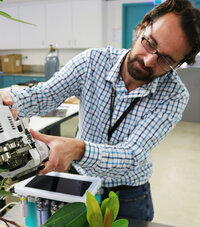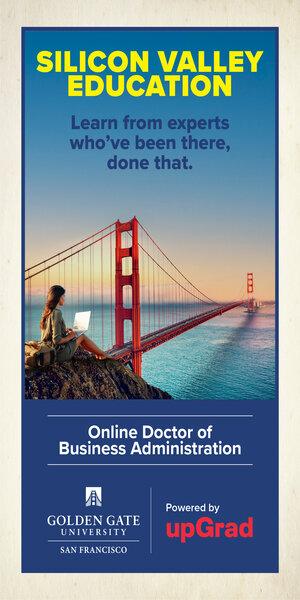- PhD Careers – What to Do After a PhD
Choosing what to do after your PhD isn’t always easy, particularly when you’re not sure if you want to work in academia. However, that doesn’t mean that there aren’t plenty of career opportunities that come with a PhD – and a good chance it’ll increase your earning potential.
This page contains an overview of some jobs you can do after a PhD. We've covered routes into academia , including postdocs and fellowships , as well as permanent academic positions . We've also expored some non-academic career options for PhD graduates .
To help you make the best decision, we also have guides on PhD employability and earnings , and how you can decide if PhD study is worth it .

We've answered some of the most frequently asked questions about PhDs, covering course types, applications, funding and the benefits of further study.

Will a PhD help you get a job or earn a better salary? And what are your career prospects in and outside of academia?

Everything you need to know about part-time and full-time work as a student or recent graduate in the USA.

Everything you need to know about part-time and full-time work in Germany as a student or recent graduate in Germany.

Academic careers
If you’re completing or applying for a PhD, it’s likely that at some point you’ll consider working in academia. Academia is the career path of researchers who work to advance teaching and research in institutes of education. While most academics are employed by universities, institutes could include government-funded experiments or sites of historical preservation, for example.
The main objective of academia is to produce original research. Though not all academics work in university, this page shall focus mainly on the university progression path.
How much do academics earn?
According to official data produced by HESA, in 2021-22 most full-time academics employed by a university in the UK were salaried between £47,419 to £63,668 . The second largest salary range, with just over 33% of academics falling into, was £35,326 to £47,419.
| Percentage of academics | Salary band | ||
|---|---|---|---|
| 0.02% | <£20,092 | ||
| 0.48% | £20,092 and £26,341 | ||
| 9.03% | £26,341 and £35,326 | ||
| 33.50% | £35,326 and £47,419 | ||
| 36.29% | £47,419 and £63,668 | ||
| 20.68% | >£63,668 | ||
| * . | |||
Average pay, however, will depend on the department. For example, those working in Biological, Mathematical and Physical Sciences are more likely to earn between £34,000-£45,000 . Whereas, surprisingly, in the Humanities, Language Studies and Archaeology a higher percentage of academics were earning above £45,000 . This, however, is likely because the sciences tend to have more job opportunities for early career researchers, thus lowering the average rate of pay.
How to become an academic
To become an academic in the UK it’s increasingly expected that candidates will have a doctoral degree . In order to obtain a doctoral degree at least an upper second-class undergraduate degree will be needed, and usually a Masters as well.
After finishing a PhD there are two different routes that can be taken to achieve a permanent position:
- The first route focuses more on teaching . After completing a PhD, graduates might take up part-time teaching roles. The experience gained will make them more competitive candidates to apply for research or teaching fellowships and permanent lecture positions.
- Alternatively, PhD graduates looking to focus on research might apply for at least one post-doctoral position. Having completed a postdoc, you will then be able to apply for fellowships and lectureships.
Candidates are not always expected to have completed a fellowship to apply for a lectureship. These roles can be obtained after completing a postdoc or teaching experience.
Postdocs and fellowships
Both postdocs (post-doctoral positions) and fellowships are fixed term contracts of research that employ recent PhD graduates. Usually contracts will be between one to four years and applicants will be expected to have completed their PhD no more than five years prior.
The main difference between postdocs and fellowships is the level of responsibility and control granted over a research project.
What is a postdoc?
A postdoc is a temporary funded research position at a university or in industry. Postdocs work under the supervision of a research group or established academic and are considered an employee, unlike PhD students. Some roles will include teaching responsibilities and assistant supervisory roles to students. Responsibilities will also include grant writing, funding applications and administrative duties.
Sometimes postdocs can be referred to as Postdoctoral Research Assistants or Postdoctoral Research Fellows. A postdoc, however, is not the same as a fellowship.
What is a fellowship?
Research fellowships are competitive and prestigious positions. Unlike postdocs, you will be funded to complete your own research project. Some positions will also guarantee a permanent academic role after completion. To successfully achieve a fellowship, you’ll need an interesting and viable research project, a history of academic excellence, and experience in writing successful funding or grant applications.
The other type is a teaching fellowship . These roles are not always for early career academics and will be offered to senior researchers so make sure you check the job description.
Do you need a postdoc or fellowship to work in academia?
Technically you do not need to have completed a postdoc or fellowship to work in academia, but it is becoming increasingly expected.
Employment in academia is more competitive each year as the number of PhDs rewarded is increasing, whereas the available permanent academic positions are not. The experience gained from completing one or more temporary positions can help you increase the competitiveness of your CV, make connections and build a positive reputation within the academic community.
Permanent positions and tenure
If you’re able to demonstrate a high level of skill in research through publications and successful funding applications, then you may be eligible for a permanent position.
Lectureships
Lecturing jobs are an entry level permanent position. Sometimes referred to as Assistant Professors, lecturers are required to teach, conduct independent research and administrative duties.
Usually lecture jobs have a probationary period of three to four years before the job is considered permanent. This period will also require successful completion of various training programmes.
The next level of academic rank is Senior Lecturer or Reader . Traditionally a senior lecturer’s position focuses on teaching whereas a reader will conduct more research. Reader positions, however, are becoming less common. Senior lecturers can also be referred to as Associate Professors, a title which is more commonly used in America.
To qualify for a promotion, you’ll usually be required to provide evidence of significant progression to a panel. Evidence could include publications, grants and contributions to teaching. Though there is no expected time frame, lecturers are often successfully promoted to senior roles after four or five years.
Professorships
Professor is the most senior position in academia. They are expected to have extensively contributed to their research field, usually having multiple published monographs, and to have taken advanced leadership roles within their department.
What is tenure?
Tenure is a form of employment security common in North America that protects lecturers from being fired without proper cause. In the UK, however, academics in permanent roles receive the same employment security offered to every worker, though the details can change depending on the hiring institution.
Non-academic careers
Not all PhD students remain in academia after graduation. Many PhD graduates are able to thrive in industry roles because of the skills gained throughout their degree.
According to the Higher Education Policy Institute (HEPI) just over 70% of PhD holders are no longer working in academia three and a half years after finishing their PhD, so you certainly won’t be in the minority if you decide that this is the best route for you!
You will have developed plenty of transferrable skills and hands-on experience during your PhD. These will serve you well when it comes to finding a job and help distinguish you from Bachelors and Masters graduates.
You’ll find PhD holders in all walks of life. From pharmaceuticals to the public sector, PhD graduates are not short of options. You also don't have to begin your industry career straight after graduation. You could go from academia to industry (or the other way around) at any point in your career.
If you're interested in the type of industry work you may be qualified for, here are some illustrative examples of PhD jobs:
- A PhD in the Arts and Humanities demonstrates excellent written communication, presentation skills, creativity and analytical thinking. You may be suited to work for jobs in the Publishing industry , Digital Marketing or Civil Service .
- A PhD in Biological and Medical Sciences builds specialist subject knowledge, data proficiency and collaborative skills. This will compliment work in industries such as Pharmaceuticals , Genomics or Clinical Care .
- A PhD in Business and Finance will help build organisational and data experience that could benefit careers in Accountancy , Data Science or Consultancy .
- A PhD in Chemical Sciences will provide you with laboratory skills and an advanced understanding of chemistry needed to benefit jobs in Chemical Engineering , Industrial Chemistry and Food Technology .
- A PhD in Earth Sciences could set graduates up for careers in Construction , Environmental Protection or Mineral Surveying , utilising analytical skills and strong subject knowledge.
- PhDs in Engineering have a strong emphasis on project management and practical construction. This could aid jobs in Management Consultancy and Finance as well as more practical fields such as Aeronautics .
- The specialist knowledge gained from a PhD in Law can enable students to comfortably enter industries such as Investment . Additionally, soft skills gained in communication will help in careers such as Teaching or Public Engagement .
- A PhD in Maths and Computing could benefit jobs in Finance , Investment or Web Development , complimenting skills in logic, problem solving and data.
- A PhD in the Physical Sciences demonstrates experience with software and data. This could set graduates up to work in Software Engineering , Data Science or even Sound Engineering .
- A PhD in Social Science and Health requires a deep understanding of human society on a macro or micro level. Graduates may find themselves working in Epidemiology , Public Health or Social Work .
You may be inclined to apply for jobs relating to the subject of your research or previous studies. But a PhD is a versatile enough qualification that you can often look outside your discipline area.
Non-academic PhD graduate jobs in STEM subjects
A PhD in a STEM subject can be used in a broad range of non-academic contexts, from industrial research settings to the public sector. Industry careers for STEM PhD holders could involve intellectual property, regulatory matters, big data, pharmaceuticals or consultancy.
Non-academic PhD graduate jobs in the Arts, Humanities and Social Sciences
If your PhD is in an Arts, Humanities or Social Science (AHSS) discipline, the skills you have to offer differ from STEM PhD holders.
Your aptitudes as a AHSS PhD graduate are likely to be suited for industries where communication skills are necessary. The ability to research and write about complex topics will be in-demand across any number of leading companies and sectors. Also, creative thinking will be highly valued by employers in strategic planning or industries such as marketing.
Making the transition to a non-academic career
You should invest some time during your PhD for personal and professional development (this is true if you want to stay in academia too!).
Even if you attend none of the formal training courses offered by your department, your PhD itself will provide you with many skills. When leaving academia, you'll need to translate your skills so they make sense to the industry and commercial employers. Think outside the box and take stock of what you are good at or have experience in.
Some translation examples include:
- The dissertation shows you're capable of presenting and organising large amounts of information.
- Having published papers shows you can communicate information across a range of formats.
- If you did interviews for your PhD project, you might graduate with skills in questionnaire design, sensitivity and data analysis.
There’s always a way to link your academic experience to the commercial world. Be prepared to do this in any upcoming job interviews.
It’s also a good idea to move away from the long, multiple page academic CV that you might be used to. Employers won’t read them. They also won’t be interested in scanning a lengthy list of articles. Instead, you should mention that you’ve had several publications without detailing every instance.
Want to find out more about PhD careers?
Check out our guide to PhD employability and earnings . Then, head to our course listings to find your perfect PhD opportunity .
Our postgrad newsletter shares courses, funding news, stories and advice
FindAPhD. Copyright 2005-2024 All rights reserved.
Unknown ( change )
Have you got time to answer some quick questions about PhD study?
Select your nearest city
You haven’t completed your profile yet. To get the most out of FindAPhD, finish your profile and receive these benefits:
- Monthly chance to win one of ten £10 Amazon vouchers ; winners will be notified every month.*
- The latest PhD projects delivered straight to your inbox
- Access to our £6,000 scholarship competition
- Weekly newsletter with funding opportunities, research proposal tips and much more
- Early access to our physical and virtual postgraduate study fairs
Or begin browsing FindAPhD.com
or begin browsing FindAPhD.com
*Offer only available for the duration of your active subscription, and subject to change. You MUST claim your prize within 72 hours, if not we will redraw.

Do you want hassle-free information and advice?
Create your FindAPhD account and sign up to our newsletter:
- Find out about funding opportunities and application tips
- Receive weekly advice, student stories and the latest PhD news
- Hear about our upcoming study fairs
- Save your favourite projects, track enquiries and get personalised subject updates

Create your account
Looking to list your PhD opportunities? Log in here .

What to Do After PhD? – Pros and Cons of Pursuing Postdoc
“Received my PhD. Where do I go from here? What to do after PhD?”—is one of the most common challenges for students who have recently graduated. So if you’re stuck at this point of deciding whether to go ahead with academia or switch to a non-academic career, you’re not alone! How do you plan on taking what you have learned in your PhD and capitalize on it? How do you start your new career or use your PhD to take the next step in your existing one?
What to Do After PhD?
After having spent endless hours conducting your research and passing up enjoyable opportunities to complete your dissertation, you have finally attained the coveted doctorate degree. It’s a remarkable feat! But one struggle that holds on to you is—what do you do now that you’ve finished your PhD?
Be it from your seniors at the university or just having heard it from scholars in your field, one thing you may have realized is that tenure-track positions in academia are hard to come by. Despite the “default” propensity of PhD graduates pursuing academic research positions, they’re now moving beyond it. Additionally, an uncertain future in academia is a factor of concern amongst all. Here we shall discuss what to do after PhD?—and focus on the pros and cons of pursuing postdoc to make a calculated decision.
Should I Pursue Postdoc?
Navigating through the career waters after PhD can be quite treacherous. Moreover, with the job market in academia being intensely competitive, even students with excellent academic caliber aren’t assured of getting a position.
While the competition is persistent, doing a postdoc is becoming a prerequisite for a successful career. However, your zeal and confidence of wanting to stay in academia can take you a long way. The preliminary postdoc benefits to consider while applying for postdoc are:
- Additional time to expand your research through funding.
- Publish more research work to support or expand your research conducted during Phd.
- More opportunities for networking and collaboration.
Pros of Pursuing Postdoc
While the answer to “What to do after postdoc?” can vary for every researcher depending on their interests, the undeniable benefits of a postdoc position can’t be overseen.
1. Career Development Prospects:
Pursuing career as a postdoc fellow allows you an extended period to work on your research after your PhD. Furthermore, it offers you more flexible opportunities to leverage laboratory facilities than you could during your PhD. It allows you to travel freely for conferences, which lead to meeting scholars from your field and making newer professional connections. Additionally, a postdoc fellow gets opportunity to upskill themselves in their research field and allied domains.
2. Advanced Research Opportunities:
Given the immense value that a postdoc position poses, it opens doors to newer research opportunities. This is not just restricted to independent research but also to collaborative research. Consequently, due to lesser teaching and administrative responsibilities, it will provide you with time to publish more research work. Additionally, it allows you to revise your project cycle, begin a new project, and gain expertise in a given subject. Furthermore, it lets you collaborate with international researchers to work on similar projects. More importantly, as a postdoc your chances of receiving grants increases based on your success as a researcher during PhD.
3. Technique Development Opportunities :
As a postdoc fellow, you have more time to acquire new technology and research skills. In addition, it lets you gain experience in allied fields that you work in with your colleagues. This leads to an excellent opportunity to perfect your distinctive set of skills and learn advanced techniques in growing times.
4. Intellectual Development:
A postdoc fellowship is a distinguished phase in your career to focus exclusively on your intellectual development. Moreover, it is an important and most influential part of your research training. Therefore, choosing a postdoc can bolster your ability to pursue an advanced and successful research career.
Cons of Pursuing Postdoc
Despite the impressive benefits, considering the flip side of pursuing a postdoc position is imperative before taking the big decision.
1. No Tenure-track Guarantee
The uncertain career prospects in academia does not guarantee a tenure-track position even after completing your postdoc. According to a survey, only 30% of postdocs in the United States, and 20% postdocs in the United Kingdom succeed in acquiring a long term academic position. Moreover, some even have to climb through a series of postdoc positions before reaching a stable academic position. This predicament often leads many postdocs to quit academia and move to an industrial career.
2. Lack of Support
As postdocs are expected to work as an independent researcher, they often receive little to no professional advice or training from experienced researchers at the university. On the contrary, some institutions take advantages of the postdoc fellow as a teaching or researching captive. Furthermore, you may also experience poor working conditions as a result of being neglected by your department and surviving postdoc position becomes difficult.
3. Monetary Challenges
One of the major disadvantages of pursuing a postdoc position is meager salaries. The financial situation of postdoc fellows is so critical that an assistant professor is paid more than them, although fractionally, but yes!
4. Over-qualification
After struggling to acquire a stable academic position, postdocs often try to switch to industrial jobs. In this process, it is found that postdocs are over-qualified for industrial jobs and have to begin from scratch in the new field.
It’s undoubtedly a great feat to have successfully defended your PhD dissertation. How do you decide? What to do after PhD? What do you choose? Let these pros and cons help you in taking a well thought out decision. Tell us how this article helped you in the comments section below! You can also visit our Q&A forum for frequently asked questions related to different aspects of research writing and publishing answered by our team that comprises subject-matter experts, eminent researchers, and publication experts.
Rate this article Cancel Reply
Your email address will not be published.

Enago Academy's Most Popular Articles

- Publishing Research
- Trending Now
- Understanding Ethics
Understanding the Impact of Retractions on Research Integrity – A global study
As we reach the midway point of 2024, ‘Research Integrity’ remains one of the hot…

- Diversity and Inclusion
Need for Diversifying Academic Curricula: Embracing missing voices and marginalized perspectives
In classrooms worldwide, a single narrative often dominates, leaving many students feeling lost. These stories,…

- Industry News
AI’s Impact on Climate: Balancing progress and sustainability
As artificial intelligence (AI) rapidly transforms various sectors of the global economy, a critical question…

- Promoting Research
- Thought Leadership
How Enago Academy Contributes to Sustainable Development Goals (SDGs) Through Empowering Researchers
The United Nations Sustainable Development Goals (SDGs) are a universal call to action to end…

- Reporting Research
How to Optimize Your Research Process: A step-by-step guide
For researchers across disciplines, the path to uncovering novel findings and insights is often filled…
Unlocking the Power of Networking in Academic Conferences
Mentoring for Change: Creating an inclusive academic landscape through support…
Intersectionality in Academia: Dealing with diverse perspectives
Meritocracy and Diversity in Science: Increasing inclusivity in STEM education

Sign-up to read more
Subscribe for free to get unrestricted access to all our resources on research writing and academic publishing including:
- 2000+ blog articles
- 50+ Webinars
- 10+ Expert podcasts
- 50+ Infographics
- 10+ Checklists
- Research Guides
We hate spam too. We promise to protect your privacy and never spam you.
I am looking for Editing/ Proofreading services for my manuscript Tentative date of next journal submission:

What would be most effective in reducing research misconduct?
Have a language expert improve your writing
Run a free plagiarism check in 10 minutes, generate accurate citations for free.
- Knowledge Base
- Applying to graduate school
- Master’s vs PhD | A Complete Guide to the Differences
Master's vs PhD | A Complete Guide to the Differences
Published on November 27, 2020 by Lauren Thomas . Revised on May 10, 2024.
The two most common types of graduate degrees are master’s and doctoral degrees:
- A master’s is a 1–2 year degree that can prepare you for a multitude of careers.
- A PhD, or doctoral degree, takes 3–7 years to complete (depending on the country) and prepares you for a career in academic research.
A master’s is also the necessary first step to a PhD. In the US, the master’s is built into PhD programs, while in most other countries, a separate master’s degree is required before applying for PhDs.
Master’s are far more common than PhDs. In the US, 24 million people have master’s or professional degrees, whereas only 4.5 million have doctorates.
Table of contents
Master’s vs phd at a glance, which is right for you, length of time required, career prospects, costs and salaries, application process, other interesting articles, frequently asked questions about master's and phd degrees.
The table below shows the key differences between the two.
| Master’s | PhD | |
|---|---|---|
| Career prospects | Usually intended for a career outside of academia. | Prepares for a research career, ideally as a university professor. |
| Length of time | 1–2 years | 5–7 in the US (master’s degree included); 3–5 outside the US (after a separate master’s degree) |
| Structure | Mostly coursework, often with a semester-long or capstone project at the end. | 2 years of coursework (in the US), followed by 3–5 years of preparing a dissertation, which should make a significant original contribution to current knowledge. |
| Cost | Varies by country, university and program; usually higher upfront cost with limited financial aid available. | Tuition fees are usually waived and a living stipend provided in exchange for being a teaching or research assistant. |
| Graduate salaries | Wage premium (compared to earnings with a high school education) is 23% on average. | Wage premium is 26% on average. |
Receive feedback on language, structure, and formatting
Professional editors proofread and edit your paper by focusing on:
- Academic style
- Vague sentences
- Style consistency
See an example

A PhD is right for you if:
- Your goal is to become a professor at a university or some other type of professional researcher.
- You love research and are passionate about discovering the answer to a particular question.
- You are willing to spend years pursuing your research even if you have to put up with a lot of dead ends and roadblocks.
A master’s degree is the better choice if any of the following apply:
- You want to continue studies in your field, but you’re not committed to a career as a professional researcher.
- You want to develop professional skills for a specific career.
- You are willing to pay a higher upfront cost if it means finishing with your degree (and thus being able to work) much faster.
- You want the option to study part-time while working.
The length of time required to complete a PhD or master’s degree varies. Unsurprisingly, PhDs take much longer, usually between 3–7 years. Master’s degrees are usually only 1–2 years.
Length of a master’s
Master’s degrees are usually 2 years, although 1-year master’s degrees also exist, mainly in the UK.
Most of the degree consists of classes and coursework, although many master’s programs include an intensive, semester-long master’s thesis or capstone project in which students bring together all they’ve learned to produce an original piece of work.
Length of a PhD
In the US, a PhD usually takes between 5 and 7 years to complete. The first 2 years are spent on coursework. Students, even those who choose to leave without finishing the program, usually receive a master’s degree at this point.
The next 3–5 years are spent preparing a dissertation —a lengthy piece of writing based on independent research, which aims to make a significant original contribution to one’s field.
Master’s degrees tend to prepare you for a career outside of academia, while PhDs are designed to lead to a career in research.
Careers for master’s graduates
There are two types of master’s degrees: terminal and research-intensive. The career prospects are different for each.
Terminal master’s degrees are intended to prepare students for careers outside of academia. Some degrees, known as professional degrees, specifically prepare students for particular professions; these include the Master of Public Policy (MPP), Master of Business Administration (MBA), Doctor of Physical Therapy (DPT), Master of Fine Arts (MFA), and Master of Public Health (MPH) degrees.
Other master’s degrees, usually Master of Arts (MA) or Master of Sciences (MS or MSc) degrees, do not necessarily lead to a specific career, but are intended to be a final degree. Examples include an MS in Communications or MS in Data Analytics.
In research-intensive master’s programs, students take coursework intended to prepare them for writing an original piece of research known as the master’s thesis . Such programs are usually intended to prepare for further study in a doctoral program.
Careers for PhD graduates
As research degrees, PhDs are usually intended to lead to an academic career. A PhD can be thought of like an apprenticeship, where students learn from professional researchers (academics) how to produce their own research.
Most students aspire to become a university professor upon the completion of their degree. However, careers in academia are highly competitive, and the skills learned in a doctoral program often lend themselves well to other types of careers.
Some graduates who find they prefer teaching to producing research go on to be teachers at liberal arts colleges or even secondary schools. Others work in research-intensive careers in the government, private sector, or at think tanks.
Below are a few examples of specific fields and non-academic careers that are common destinations of graduates of those fields.
- Computer Science
- Lab Sciences
Many government jobs, including economists at a country’s central bank, are research-intensive and require a PhD. Think tanks also hire economists to carry out independent research.
In the private sector, economic consulting and technology firms frequently hire PhDs to solve real-world problems that require complex mathematical modeling.
Graduate students from the humanities are sometimes hired by museums, who can make use of their research and writing skills to curate exhibits and run public outreach.
Humanities PhDs are often well-suited to research and grant-writing roles at nonprofits. Since so much of research is funded by grants, PhD students often gain a lot of experience applying for them, which is a useful skill in the nonprofit sector.
There are a wide range of non-academic research jobs for lab scientists with doctorates in subjects like chemistry, biology, ecology and physics.
Many PhD graduates are hired by pharmaceutical companies that need to perform research to create and test their products. Government agencies, such as the Environmental Protection Agency (EPA), also hire lab scientists to work on research projects.
Job prospects after graduation vary widely based on the field. In fields like management, computer science, statistics, and economics, there’s little underemployment—even graduates from less well-known programs can easily find jobs that pay well and use the skills they’ve gained from the PhD.
However, in other fields, particularly in the humanities, many PhD graduates have difficulty in the job market. Unfortunately, there are far more PhD graduates than assistant professor roles, so many instead take on part-time and low-paid roles as adjunct instructors. Even non-academic careers can sometimes be difficult for PhDs to move into, as they may be seen as “overqualified” or as lacking in relevant professional experience.
Because career options post-PhD vary so much, you should take the time to figure out what the career prospects are in your field. Doctoral programs often have detailed “placement” records online in which they list the career outcomes of their graduates immediately upon leaving the program. If you can’t find these records, contact the program and ask for them—placement information should play an important role in your choice of PhD program.
Prevent plagiarism. Run a free check.
Although PhDs take far longer to complete, students often receive a living stipend in exchange for being a teaching or research assistant. Master’s degrees are shorter but less likely to be funded.
Both master’s degrees and PhDs lead to increased salaries upon graduation. While PhDs usually earn a bit more than those with a master’s degree, in some fields, the wages are identical, meaning that no financial benefit is gained from going on to a PhD.
Cost of a master’s
The upfront cost of a master’s degree is usually higher than a doctoral degree due to the lower amount of financial aid available. However, increased salaries also arrive faster than with a doctoral degree, because people graduate much earlier from a master’s program.
Some master’s students do receive stipends for their degrees, usually as compensation for being a teaching or research assistant. In addition, many people complete master’s degrees part time while working full-time, which allows them to fund their living costs as well as tuition.
The cost varies significantly by school and program. Public schools are usually cheaper than private ones. Some master’s degrees, such as MBAs, are notoriously expensive, but also result in much higher wages afterwards that make up for the high cost.
The master’s wage premium , or the extra amount that someone with a master’s degree makes than someone with just a high school diploma, is 23% on average. Many universities provide detailed statistics on the career and salary outcomes of their students. If they do not have this online, you should feel free to contact an administrator of the program and ask.
Cost of a PhD
PhDs, particularly outside the humanities, are usually (though not always) funded, meaning that tuition fees are fully waived and students receive a small living stipend. During the last 3–5 years of a PhD, after finishing their coursework (and sometimes before), students are usually expected to work as graduate instructors or research assistants in exchange for the stipend.
Sometimes students can apply for a fellowship (such as the National Science Foundation Graduate Research Program in the United States) that relieves them of any obligations to be a teaching or research assistant. Doctoral programs in the US tend to be better funded than in the rest of the world.
Sometimes, PhD degrees can be completed part-time, but this is rare. Students are usually expected to devote at least 40 hours a week to their research and work as teaching or research assistants.
The main cost of doctoral programs comes in the form of opportunity cost—all the years that students could be working a regular, full-time job, which usually pays much better than a graduate school stipend.
The average wage premium for PhDs is 26%, which is not much higher than the master’s degree premium.
In the US, the application process is similar for master’s and PhD programs. Both will generally ask for:
- At least one application essay, often called a personal statement or statement of purpose .
- Letters of recommendation .
- A resume or CV .
- Transcripts.
- Writing samples.
Applications for both types of programs also often require a standardized test. PhDs usually require the Graduate Record Examination (GRE), which tries to measure verbal reasoning, quantitative, critical thinking , and analytical writing skills. Many master’s programs require this test as well.
Applying for a master’s
Master’s degrees programs will often ask you to respond to specific essay prompts that may ask you to reflect upon not just your academic background, but also your personal character and future career ambitions.
Northwestern University’s Kellogg Business School requires Master’s of Business Administration (MBA) applicants write two essays, one about a recent time they demonstrated leadership and the second about their personal values.
Who you should ask for your letters of recommendation varies by program. If you are applying to a research-intensive master’s program, then you should choose former professors or research supervisors. For other programs, particularly business school, current work supervisors may be a better choice.
Some professional master’s programs require a specific test. For example, to apply to law school, you must take the Law School Admissions Test, or LSAT. For business school, you must take either the GRE or the Graduate Management Admissions Test (GMAT).
Applying for a PhD
When applying for a PhD, your resume should focus more on your research background—you should especially emphasize any publications you’ve authored or presentations that you’ve given.
Similarly, your statement of purpose should discuss research that you’ve participated in, whether as an assistant or the lead author. You should detail what exactly you did in projects you’ve contributed to, whether that’s conducting a literature review, coding regressions, or writing an entire article.
Your letters of recommendations should be from former professors or supervisors who can speak to your abilities and potential as a researcher. A good rule of thumb is to avoid asking for recommendations from anyone who does not themselves have a PhD.
If you want to know more about college essays , academic writing , and AI tools , make sure to check out some of our other language articles with explanations, examples, and quizzes.
College essays
- College essay examples
- College essay format
- College essay style
- College essay length
- Diversity essays
- Scholarship essays
Academic writing
- Writing process
- Avoiding repetition
- Literature review
- Conceptual framework
- Dissertation outline
- Thesis acknowledgements
- Burned or burnt
- Canceled or cancelled
- Dreamt or dreamed
- Gray or grey
- Theater vs theatre
A master’s is a 1- or 2-year graduate degree that can prepare you for a variety of careers.
All master’s involve graduate-level coursework. Some are research-intensive and intend to prepare students for further study in a PhD; these usually require their students to write a master’s thesis . Others focus on professional training for a specific career.
A PhD, which is short for philosophiae doctor (doctor of philosophy in Latin), is the highest university degree that can be obtained. In a PhD, students spend 3–5 years writing a dissertation , which aims to make a significant, original contribution to current knowledge.
A PhD is intended to prepare students for a career as a researcher, whether that be in academia, the public sector, or the private sector.
This depends on the country. In the United States, you can generally go directly to a PhD with only a bachelor’s degree, as a master’s program is included as part of the doctoral program.
Elsewhere, you generally need to graduate from a research-intensive master’s degree before continuing to the PhD.
This varies by country. In the United States, PhDs usually take between 5–7 years: 2 years of coursework followed by 3–5 years of independent research work to produce a dissertation.
In the rest of the world, students normally have a master’s degree before beginning the PhD, so they proceed directly to the research stage and complete a PhD in 3–5 years.
A master’s degree usually has a higher upfront cost, but it also allows you to start earning a higher salary more quickly. The exact cost depends on the country and the school: private universities usually cost more than public ones, and European degrees usually cost less than North American ones. There are limited possibilities for financial aid.
PhDs often waive tuition fees and offer a living stipend in exchange for a teaching or research assistantship. However, they take many years to complete, during which time you earn very little.
In the US, the graduate school application process is similar whether you’re applying for a master’s or a PhD . Both require letters of recommendation , a statement of purpose or personal statement , a resume or CV , and transcripts. Programs in the US and Canada usually also require a certain type of standardized test—often the GRE.
Outside the US, PhD programs usually also require applicants to write a research proposal , because students are expected to begin dissertation research in the first year of their PhD.
Cite this Scribbr article
If you want to cite this source, you can copy and paste the citation or click the “Cite this Scribbr article” button to automatically add the citation to our free Citation Generator.
Thomas, L. (2024, May 09). Master's vs PhD | A Complete Guide to the Differences. Scribbr. Retrieved June 24, 2024, from https://www.scribbr.com/graduate-school/masters-vs-phd/
Is this article helpful?

Lauren Thomas
Other students also liked, when to apply for graduate school | month-by-month timeline, how to write a statement of purpose | example, how to write a graduate school resume | template & example, get unlimited documents corrected.
✔ Free APA citation check included ✔ Unlimited document corrections ✔ Specialized in correcting academic texts

After a PhD
Learn about life after a PhD, from employability statistics to career prospects. Find out the skills you’ll gain, how to apply these to a range of professions and how to continue enhancing your profile as a researcher.
Key Resources

Postdocs: The Definitive Guide
A postdoc can be a crucial stepping stone to a successful career after completing a PhD. Find out what they are, what they involve and much more.

Transferable PhD Skills You Can Use in Any Career
From communication to time management, you will gain a large variety of transferable skills from completing a PhD. Learn what these are and how to use them in your CV.

Life After a PhD: What Can You Do?
Find out the most common career paths for doctorates both within and outside of the academic world.
Supporting Resources

What is a Research Assistant?
Research assistants are employed by research institutes to assist with academic or private research. Find out all you need to know about the role.

Lecturer and Professor Salaries – Explained
Thinking about becoming a University Lecturer? If so, you’re going to want to learn all about the teaching and researching life, including the salary you can expect!

The Journal Peer Review Process
The journal peer review process to publish a research paper can take several months to complete. Learn more about all the different steps involved here.

What You Can Expect as a New University Lecturer
Starting a career as a university lecturer can be one of the most rewarding highlights of your academic journey. Learn more about what to expect in this demanding role.

What Can You Do with A PhD in Public Health?
Studying public health is a wonderful choice for those who wish to dedicate their career to advancing healthcare delivery and improving the health and wellbeing of the public.

What Can You Do With A PhD In Sociology?
A PhD in sociology provides insight into social concepts and requires a strong understanding of statistics and data; learn more about career options afterwards.

Turn Your PhD Thesis Into a Paper
There may be opportunities to convert your thesis into a form ready for peer-review. Here’re a few tips to help you on your paper writing journey.
Gain valuable insight from our collection of exclusive interviews with both current and past PhD students. Learn from their best advice, personal challenges and career path after completing their doctorate.
What is a PhD Degree? [2024 Guide]
As you’re taking a look at potential grad school programs, you might be asking yourself, “What is a PhD degree?”

Understanding what a PhD is and what’s involved in earning one can help you decide whether to enroll in this type of doctoral program. You might decide that a PhD is a strategic step for you to take to further your career.
Editorial Listing ShortCode:
If you choose to pursue a PhD, you’ll be glad to know that you can also earn this type of degree online through an accredited university.
What Is a PhD Degree?

After earning a bachelors degree and a masters degree, you may be considering taking your education even further.
The next step for you might be a Doctor of Philosophy degree, better known as a PhD. As a terminal degree, a PhD can set you apart as an expert in your field. Earning a doctoral degree is not a small undertaking. The process includes multiple steps and can last for several years.
Components of a Ph.D. degree program often include:
- Advanced courses in your chosen field
- Classes in research methods, data analysis, and scholarly writing
- Examination of current literature and studies related to your field
- Oral or written comprehensive exams
- Original research project—includes writing and defending a major paper about your research
The dissertation, sometimes known as a thesis, is usually the part of a PhD program that takes the longest. During the dissertation process, you’ll work under the supervision of a faculty advisor, often someone whose research interests correlate with yours. You’ll design a research project, carry it out, and write about your findings. This project is meant to contribute new ideas to your field.
A PhD is particularly suitable for students who love school settings and want to pursue academic careers. For instance, professors often have PhDs. It’s also common for scientists and other researchers to hold this type of degree. Outside of academia, a PhD could set you apart as a knowledgeable leader in your field.
Benefits of a PhD Degree

Getting your PhD can be an incredible personal goal worth achieving. Plus, a degree at this level can offer many professional benefits, such as:
- Career advancement . As a person with a PhD, you may be considered an expert in your field. That could help qualify you for a variety of top roles within your line of work.
- Higher earnings . A job promotion or a new employer might offer you a higher salary.
- Networking . You can meet new people and build professional connections as you work toward a PhD.
- Preparation for becoming a professor . Universities typically prefer to hire faculty members who hold PhDs in their area of expertise.
- Research opportunities . Before you can earn your PhD, it’s necessary to complete an original research project called a dissertation. After completing your degree, you may have additional opportunities to contribute research to your field.
If you’re willing to put in the work, then getting your PhD could be worth the effort.
How to Know If a PhD Is Right for Me

Before you sign up for a PhD program, it’s helpful to carefully weigh the decision and make sure it’s the right choice for you. You might ask yourself the following questions:
- Am I willing to commit years to the process ? PhDs take at least 3 years, and most take longer than that.
- Do I want to carry out original research ? This is a research-focused degree, and the purpose is to contribute new ideas or theories to your field.
- Does an academic career interest me ? Many people get PhDs because they want to work in higher education as teachers or researchers. Those who plan to remain as practitioners often consider professional doctorates instead.
It can also be helpful to speak with faculty members and current students to get a feel for what you can expect from PhD studies.
Applying for a Ph.D: Education Requirements

It’s necessary to put in years of study before you can apply for a PhD program. Most students need to hold at least two degrees already. But, in some cases, one may be sufficient.
- Bachelor’s degree . All graduate programs require students to have earned a four-year undergraduate degree before enrolling in advanced studies. Most PhD programs don’t specify that your bachelors degree must be in the same field as your hoped-for doctoral studies, but it can help you move through a graduate-level program with more ease.
- Master’s degree . Colleges often expect students to have earned a master’s degree before applying for PhD studies, but some programs do allow students straight out of bachelor’s degree programs. Doing a master’s degree first can provide strong preparation for the advanced coursework, research, and writing that are required in doctoral programs.
It is often required that the degrees you have be from accredited colleges. It may also be necessary to meet a minimum GPA requirement, such as a score of 3.0 or higher. Some colleges prefer PhD applicants who have graduated from previous programs with honors.
Doctor of Philosophy: Admissions Requirements

Doctoral programs can be quite selective about whom they admit because they’re looking for capable students who can keep up with the demands of the program and contribute valuable new research to the field.
In addition to meeting the education requirements, you’ll also be required to turn in records that demonstrate your academic potential. Here are some common admissions requirements:
- College transcripts and professional resume
- Letters of recommendation from people who know you academically or professionally
- Statement about relevant background, research interests, or professional goals
- Proposal that presents the original research project you’d be interested in doing
- Scores from the GRE or GMAT (not always required)
You might also connect with the department’s faculty members and find someone who would be willing to serve as your academic supervisor for your dissertation. It’s beneficial for this person’s research interests to align with your own.
Some schools have you do this before admission, and others connect admitted students to supervisors later in the enrollment process.
What Does PhD Stand For?

PhD stands for “Doctor of Philosophy.” It doesn’t mean that you’ve studied philosophy at the highest levels. Rather, the word “philosophy” in the name refers back to ancient Greek. It implies that you are someone who loves and seeks wisdom and knowledge.
You can get a PhD in many different subject areas—such as a Doctor of Philosophy in Mathematics or a Doctor of Philosophy in Psychology. PhD students explore their chosen field of study in great depth. They also learn how to conduct original research, and they undertake major research projects. By graduation, they are considered experts in their fields.
What Do You Learn in a Doctoral Degree?

In a PhD program, you’ll learn about your chosen area of study, such as biology or sociology. You will also study a niche area within that field in great depth.
Research is a significant topic in any PhD program. Your courses might include topics on:
- Advanced statistics
- Dissertation preparation
- Literature review
- Quantitative and qualitative methods
- Research methodology
These research-focused classes may be tailored to your particular area of study, such as research methodology in the social sciences or advanced statistics in criminal justice research.
What Can You Do with a PhD Degree?

Many people earn PhD degrees because they want to teach at the college level. This degree is often required for tenured faculty positions at universities.
The Bureau of Labor Statistics states that most postsecondary teachers earn between $46,690 and $172,130 each year. Research scientists often hold PhDs as well. Examples include medical scientists, biochemists, and physicists.
Additionally, there are some career paths that require a doctorate for licensure. For instance, clinical and counseling psychologists usually need to receive training at the doctoral level before they can practice independently.
Do You Need a Masters to Get a PhD?

Whether you’ll need a masters before you can begin the PhD process will depend on the program you choose.
Many PhD programs require a master’s degree as an admissions requirement. Completing a master’s program can provide a strong research and writing foundation that can help you during this advanced program. Other programs, though, let students enroll with only a bachelors degree.
There might be additional classes required to prepare you for working at the graduate level, so it may take a bit longer to complete your studies. For more information on whether you need a master’s to get a PhD , you can consult the admissions requirements of each program you’re considering.
Can You Get a PhD Online?

There are many online PhD programs available for aspiring students looking for flexibility. Some PhD programs are offered entirely online. You can take all of your classes online, and you can also receive guidance from your faculty advisor and defend your dissertation from afar.
Other programs are mostly online but require some in-person experiences. You might be asked to come to campus for a week or two of intensive study. Also, you may be asked to show up in person for your dissertation defense. Either way, online PhD studies are often more accessible for working professionals than fully on-campus programs.
How Long Does It Take to Get a PhD?

Students often spend 3 to 5 years completing a PhD program. Online programs sometimes include features like year-round classes and short course terms that encourage quick completion.
The shortest PhD programs typically do not involve writing a dissertation. There may be a different final assignment, such as a capstone project, instead. You might be able to finish one of those programs in about 3 years. Not all students finish within 5 years. Some spend around a decade on this massive undertaking. Some PhD programs set an upper limit for completion, such as 7 or 8 years.
Is a PhD a Doctor?

People with PhDs are considered experts in their fields, and the degree includes “Doctor” in its name. For that reason, PhD holders often use the title “Doctor.” A college professor, for example, might go by Dr. Smith.
Even still, there’s a difference between MD vs. PhD. A person who holds a PhD is not a medical doctor. Medical doctors earn a Doctor of Medicine (MD) degree before becoming licensed to practice medicine. In most contexts, though, people refer to professionals with PhDs as “doctors.”
What Jobs Can You Get with a PhD?

People with doctorate degrees work in both academia and professional practice. Being a college professor is quite popular among people who hold PhDs. The Bureau of Labor Statistics says that a PhD can also be helpful for obtaining jobs in higher education administration, particularly as a dean or a provost.
PhD graduates may work in research as well. Research jobs are available with colleges, government agencies, and private institutions. Researchers are needed in many different fields, including biology, mathematics, computer science, and economics. PhDs also help people rise to the top in their industries, perhaps as chief executives.
How Much Does a PhD Cost?

Some graduate schools charge just $300 to $400 per credit hour. Others may charge $2,000 per credit hour or more.
Per-credit-hour rates between $600 and $1,000 are quite common. It’s helpful to keep in mind that state universities often charge less for in-state residents than nonresidents. Your total number of credit hours may depend on how many years you spend working on your dissertation.
Some universities offer tuition-free PhD programs for qualifying participants. The students may even receive a stipend in exchange for research or teaching assistance. This arrangement is more common for on-campus programs than online ones.
What’s the Difference Between a Doctorate vs. PhD Degrees?
Is a PhD a doctorate degree ? For your terminal degree, you may have the choice between a PhD degree and a professional doctorate. While they are both doctoral degrees, they do have some differences.
Professional doctorates are sometimes a year or two quicker than PhDs, but that’s not always the case.
Is a PhD Worth It?

Yes, a PhD is worth it for many students. For one thing, holding a PhD could be the key to fulfilling your professional dreams.
If you want to be a professor, for instance, there’s a good chance that you’ll be required to have this advanced degree. Even if that’s not your ultimate goal, a PhD could be beneficial. The more education you have, the more your job security usually increases.
According to the Bureau of Labor Statistics, there’s an inverse relationship between education and unemployment. As education increases, unemployment rates decrease.
Getting Your PhD Degree Online

An exciting future as an expert in your field may await. You can earn a PhD to increase your knowledge, prove your capability, and contribute new ideas to your area of study. Getting this degree is an impressive accomplishment, and it may open new doors for your career. For convenience and accessibility, you might take a look at online PhD studies.
Many accredited colleges offer robust online PhD programs. You’ll get to take advanced courses and work with respected professors. An online program can also offer opportunities for completing a thesis or a doctoral project. You could graduate prepared to make a difference in your field.
Why not start exploring your options today?

Educational resources and simple solutions for your research journey

Career Opportunities After PhD: Tips for a Successful Job Search
Table of Contents

Challenges with employment and career opportunities after PhD
The current academic job market has become increasingly competitive for PhD graduates, which has made it important for them to explore the available options and careers after PhD. PhD holders exceed the limited tenure positions and are often forced to move to non-academic positions or remain underemployed in career paths after PhD that often require lesser degrees. Graduates of some fields may better navigate non-academic labor markets than others. 1
For example, STEM, business, and economics graduates are more likely to obtain industry-specific technical and applied skills. But, others wondering how to get into industry after PhD may not recognize the extent to which their problem-solving, analytical, and critical-thinking skills may be used outside academia.
Non-academic careers after PhD are not simply a preference but have become a necessity for many PhD holders, especially when academic jobs are limited. It could also be related to your personal values, family situation, instability/insecurities in working on a contract, preferences or available career options after PhD. Doctoral students also perceive limited support and a lack of resources to address their diverse career development needs during their training as a reason for this shift. 2 Most often, PhD scholars don’t know how to get into industry after PhD as they feel they are misfits here. The extent of mismatch could be in terms of skills, the field of study, and over-qualification. This article can help you overcome some challenges in finding suitable career opportunities after PhD.
Career options after PhD
Most often, PhD scholars don’t know how to get into industry after PhD as they feel they are misfits here. The extent of mismatch could be in terms of skills, the field of study, and over-qualification. This article can help you overcome some challenges in finding suitable career opportunities after PhD.
The following are just some of the PhD career options you have upon achieving your doctorate:
In academia
- Adjunct faculty position
In industry
- Policymakers/Adviser to policymakers
- Entrepreneur
- Public speaker
Optimizing your job search for great careers after PhD
As a PhD student, you might find it hard to decide the next step in your career after PhD. Not everyone completing a PhD will find full-time tenure positions at higher education institutions. You would naturally want a lucrative and rewarding career after PhD that makes all the hardships worthwhile. But choosing between academic/non-academic jobs or private/public sector jobs can be challenging, especially if you are unfamiliar with the job-hunting game inside/outside of academia. The following steps can help you with your job search process and steer your career path after PhD.
- Reflect : Look back on your experiences to identify what aspects of your research you enjoyed most. It could be experimental or fieldwork, creative writing, connecting with other researchers or managing your project. There are many career options for PhD holders in the market and some reflection will help you identify the direction in which you want to go.
- Decide location : Your preferred location can influence your job search. Think about where you’d like to live and the job opportunities and career options for PhD holders available there. Often, you might find that you want to go back to your home country to pursue a career after PhD and would have to adjust your job search depending on the type of jobs available locally. Therefore, looking for the right job in the right place can reduce your search time.
- Network : Many PhDs underestimate the importance of networking effectively and having a good communication strategy in determining their careers after PhD. Jobs received through university networks tend to align with your education and offer better career opportunities after PhD. 3 So find some time to attend events and network with stakeholders in top companies and other universities. Speaking to senior colleagues about your job search can also help you understand their experiences and learn how to get into industry after PhD. Finally, make sure to have a LinkedIn profile to connect with people having similar interests and careers after PhD.
- Career centers : Your university career center can also offer guidance on possible careers after PhD, especially finding a good position upon graduating. They can also help you familiarize yourself with institutions that award research grants and their requirements.
- Websites : You may find career opportunities for PhDs on university websites or other relevant platforms, such as:
-Nature careers
-New scientist jobs
-Science Careers
-Technojobs-PhD jobs
- Strong resume : When applying for non-academic jobs, focus on enhancing the many transferable skills from your PhD, such as:
-Communication skills – your work with presentations, lectures, or seminars
-Creative thinking – good at outside-the-box thinking
-Management – great with time, workloads, mentoring undergraduate students
-Problem-solving skills – mention the many research problems solved
Use the following strategies to enhance the quality of your CV or resume for better
- Highlight achievements: Your CV should include sufficient detail to show a selection committee that you are the perfect candidate for the job. Update your CV regularly to include recent achievements and skills gained that are relevant in careers after PhD.
- Tailor-made for the job: Fine-tune your CV to meet the job requirements. An academic CV should be different from a non-academic one to match the needs of that particular opportunity. A 1-2 page summary of your experiences and expertise is sufficient for an industry job, but your academic CV should include a full record of your work and can be much longer.
- Add specific, credible information: To secure the best career after PhD, ensure the CV you submit is supported by sufficient details of specific experiences that highlight your efforts and skills.
- Add evidence: Incorporate quantitative evidence or proof to support the facts in your CV. Do not fabricate information that will crumble under scrutiny and mar your career options after PhD.
- Start early and keep looking: Finally, start your job search early and keep looking until you have found a job that meets your requirements.
You can pursue a variety of careers after PhD, and we hope the points above help you find the best career opportunities after your PhD is over. Best of luck with your applications!
Related Posts

Thesis Defense: How to Ace this Crucial Step

What is Independent Publishing in Academia?
View the latest institution tables
View the latest country/territory tables
Finished your PhD? Six questions to ask yourself about what’s next
There is no single path to success, so here's a plan to help you choose.
Natalie Parletta

Credit: z_wei/Getty Images
13 October 2020

z_wei/Getty Images
Early career researchers can find it challenging to decide what to do next after dedicating years to their PhD.
There are many different paths that can lead to a successful career, from increasing your publication numbers or transitioning to a different lab or institution to acknowledging that what you really need is a break.
Nature Index asked five researchers for their insights on what to do after completing a PhD.
1. Pursue your passion project – even if it’s niche
“I can’t emphasise enough that science has to be something you love doing,” says biologist Aaron MacNeil from Dalhousie University in Canada, who studies marine conservation, focussing on species such as reef sharks and monkfish.

Aaron MacNeil
But what if you’ve been researching a niche topic that will only ever have small amounts of funding and a small pool of collaborators?
To balance passion and productivity, geneticist Marguerite Evans-Galea from Australia’s Murdoch Children’s Research Institute suggests running two projects in parallel, even if one is an offshoot of the other. She notes, for example, that some of the greatest techniques in conservation were borrowed from economics.
Pursuing a research area that’s more advanced and can garner more funding gives you the opportunity to continue working on your niche area where time permits.
Ask yourself : Now that you no longer have the structure of a PhD program in place to support your passion project, do you have the right collaborators to help keep the momentum up?

Alessandro Ossola
2. Move to a different lab or institution
“To grow academically and personally, you need exposure to new ideas, people and places,” says Alessandro Ossola, an urban ecology researcher at Macquarie University in Sydney, Australia.
Ossola made several unsuccessful postdoc applications towards the end of his PhD before winning a fellowship with the United States’ National Research Council (NRC). Ossola says his experience working with the NRC gave him a better understanding of government procedures, which has helped him pursue research that can make a tangible difference to people’s lives.
Moving cities or even countries can be an excellent career decision to gain new skills and a wider network of collaborators.
While the pandemic may prevent such moves just now, Terry Ord, an evolutionary ecologist at the University of New South Wales in Sydney, Australia, recommends that new PhD graduates use this time to research the labs and institutes that interest them, connecting with their researchers via Zoom.
Ask yourself : What preparation work can I do now to ensure that I’m in a good place to make a move once travel restrictions are lifted?

Trisha Atwood. Credit: Edd Hammill
3. Switch fields and work your way up again
Some researchers may consider switching fields. The competitive research environment can make it difficult to catch up, but not impossible.
After completing her PhD, Trisha Atwood, assistant professor in the Department of Watershed Sciences and the Ecology Center at Utah State University in Logan, Utah, left the US to do a postdoc on an unfamiliar research topic (carbon storage in marine systems) at Australia’s University of Queensland.
“That opportunity reshaped my research and catapulted my career,” she says. “I got to work with some of the most productive, creative, and nicest people I’ve ever met in research.”
Although working your way back up in a new field may be daunting, Atwood says there are advantages. “If you can integrate aspects of your past field with your current one, you may be able to do something truly transformational.”
Ask yourself : Are you ready to ‘start again’ in a new field and work your way up, and do you have a supportive environment to get you through the initial challenges?
4. Stay the course and focus on publishing
Publications are important, but it’s not just a numbers game, says Evans-Galea. “To compete on the international stage, you need to be publishing quality over quantity, driving change and making a difference.”
Evans-Galea recommends reading often , which can deepen and broaden your knowledge base and make you a better and more productive writer.

Marguerite Evans-Galea
And while you can’t always be publishing ground-breaking work, Ord recommends that young researchers challenge themselves to turn an average paper into something better, by packaging it with a meta-analysis, for instance, or using a null finding to challenge an accepted paradigm.
Ask yourself: Which papers do I truly admire, and what elements can I take from those to improve my own manuscripts?
5. Consider an industry role
A PhD can be a distinct advantage when pursuing an industry role. If this appeals to you, investigate what industries relevant to you are looking for, as corporate organizations tend to value expertise differently to academic institutions.
Some industries value communication and teamwork skills more highly than individual achievement, for example.
Networking can be the key to gaining a good position with industry. Isaiah Hankel , a business consultant and author, contacted employers on LinkedIn after completing his PhD in anatomy and cell biology at the University of Iowa. He attended networking events and organized chats and site visits with prospective employers before being hired as an application scientist at biosciences company FlowJo.
Ask yourself : Am I comfortable leaving academia for at least the next few years, to further my career?
6. Take time off, but keep up your connections
If you’re not ready to make a decision on next steps, you may be able to step away for a while.
This can be especially useful if you’re yet to publish a paper. MacNeil suggests taking on a part-time job if possible and using your spare time to write up and publish papers based on your thesis work.
It’s important to treat your break as a breather – not a holiday – so you don’t feel too far behind once you’re ready to return to research. Keep up connections and volunteer at conferences while working on publications. You could also take writing courses or create an academic blog.
Ask yourself : Are you ready to jump straight into another high-pressure environment, or would you be better off taking some time to recoup, publish, and explore your options?
Stack Exchange Network
Stack Exchange network consists of 183 Q&A communities including Stack Overflow , the largest, most trusted online community for developers to learn, share their knowledge, and build their careers.
Q&A for work
Connect and share knowledge within a single location that is structured and easy to search.
I wasted six years of my life getting a PhD degree. What should I do, and how will I survive?
I struggled with low self confidence throughout my bachelors, masters and PhD in chemical engineering. After spending two years in Masters and six years in getting a PhD degree, I am lost at what I can do with my life.
Initially, my plan was to be in academia. Though I love doing research, I don't see that as a possibility anymore.
I did not do well in my PhD. I have only two first-author journal publications in ~2.5 impact factor journals. I did not acquire significant skills. I am bad at programming, and I have a 3.7 GPA. I did not learn to drive or learn any foreign language. I did not improve my health or developed a new hobby. I even did not spend time on having a relationship. In short, I have done nothing over the past six years.
My PhD supervisor has given me a postdoc position. And I feel extremely inadequate. I feel that I won't be able to do anything after my postdoc year, and I will just be a burden and disappointment to my parents.
I am an international student living in the US.
I don't know what I should do. What should I do?
- career-path
- academic-life
- early-career
- emotional-responses
- 190 I think your only issue is one of self esteem. I suggest you find a counsellor and discuss where you are and how you feel. Don't let imposter syndrome lead to depression. Your advisor can give you professional advice, but you should also seek personal advice. The future is brighter than you think. – Buffy Commented Dec 7, 2019 at 16:30
- 7 Is the work fun though? – smcs Commented Dec 9, 2019 at 9:52
- 1 Is there anything in your past that is unresolved? I suspect your low self confidence stems from something else and not the PhD itself. For example you mention lack of relationship, so I suspect you have a non-existent sex life. Are you exercising and eating right? All of those things need to be in order for you to be happy doing a PhD. Otherwise all you'll have is a PhD which is empty and meaningless. – sashang Commented Dec 9, 2019 at 23:45
- 3 ‘I have only two publications …’ to me, who has a grand total of zero from both the PhD project that fell short of its desired outcome and my first two years of postdoc in which the ‘basically already finished, just this’ project turned out almost impossible, this is quite a violet slap in the face. – Jan Commented Dec 10, 2019 at 2:33
- 1 Seek counselling! The problems you describe have very little to do with academia, but very much with you. This website cannot provide adequate counselling in that regard (although some of the answers of course hit very relevant points). – user2705196 Commented Dec 10, 2019 at 18:21
9 Answers 9
It looks to me like you did not do so badly as you think. Two publications and 3.7 GPA are not so bad. It might depend on the field, it might not be the best ever, but I have seen much worse. If your supervisor offered you a postdoc position after having you for 6 years as a PhD student, it means that they consider your work useful.
You might be suffering from impostor syndrome . Do read the question and the answers in that link and see if you identify.
If you are not sure now, you have plenty of time during your postdoc year to decide whether you want to continue in academia or get a job in industry. The pros and cons of both options have been discussed extensively, as a quick Google search for "industry vs academia" shows. I personally agree with this source .
And, in most cases, the answer to "I have wasted X years of my life because I did not do Y and Z" is "do not look at the past and do Y and Z now". Especially when, as in your case, Y and Z can be done at any stage in your career life, such as learning languages, programming or driving.
- 27 Also, the field is chemistry, where the PhD is basically required for an entry level position in industry, so that is certainly not a waste of time. – Simon Richter Commented Dec 8, 2019 at 13:29
- 13 @SimonRichter Actually, the field is engineering (chemical engineering) where a BSc is enough for entry level jobs industry. – Cell Commented Dec 8, 2019 at 16:52
- 2 Get a job in industry. The great part is, that at the end of the project/delivery/month, work is done and completed. At least for me, I never considered the results in science 'done'; also pace is probably faster, so you will get getting quite a few achievements under your belt quickly (since you are smart). – lalala Commented Dec 8, 2019 at 19:03
- 3 @Cell Where I've worked, a PhD is automatically hired into a position that it would take ~5 years to get promoted to from entry-level with BSc, and the PhD can offer more job opportunities and security in the right industry. If OP goes into industry, the last six years could be well worth it! – Sam Commented Dec 8, 2019 at 19:45
- 1 @Sam That's nice, but I never said getting a PhD is a bad idea. I was only correcting the previous poster. With that being said, unless you plan on doing novel research, a PhD may make you overqualified for many jobs that can be done by a BASc, or MEng. You also didn't say what your field is. – Cell Commented Dec 8, 2019 at 20:20
To be honest, I'm tempted to agree with Buffy. It sounds like the biggest issue you have might actually be the one you identified at the start of your post - low self-confidence. Studying for a PhD, and working in academia in general, has a tendency to have that effect on people - you're far from alone.
If I were you, I'd be tempted to take stock of my overall life situation at this point, perhaps with some input from the people around me, and try to get an objective view of how things really are - they may not actually be as bad as you think.
For example, here are some plus points:
You finished a PhD. That's already a huge deal - lots of people don't even start a PhD, and of those who do, a proportion never finish. Of those who finish, lots of people feel like they didn't change the world with their PhD, and that's fine - most people don't, and that's not required. You've got the rest of your life to worry about that, if you want to, and it's not required even then. It's ok to just live and be happy sometimes.
You've got a postdoc position lined up, if you want to stay in academia. Your supervisor wants you to stay, which means you probably did something right during your PhD. Maybe your PhD didn't actually go as badly as you think.
If you've just finished your PhD, it's quite likely (in the absence of other evidence to the contrary, which I don't have) that you're still relatively young. That means you've got time on your side - there's still a whole lot of life ahead of you in which to do all the things you want to do (learning to drive, learning a foreign language, improving your health, developing your hobbies, having a relationship, ...). It sounds like you're unhappy that you haven't been doing those things, which means you'd probably be happier if you started doing them. Pick one and go start on it right now - hopefully you'll feel better (it's generally worked for me, when I've been feeling down). Starting on one of them sounds like much more fun than carrying on feeling fed up about not doing them, at any rate.
Best of luck!
p.s. For what it's worth, the fact that you've got a list of things you wish you'd been doing, and are unhappy that you haven't been doing them, is a good sign - there's an easy fix for that, which is go do some of them. That's much better than not having a list of things, and sitting there having existential angst and wondering whether life is pointless :)
- The postdoc is with my PhD advisor. I don't think that's an achievement. Probably my advisor felt pity on me and gave me the position. – Abhik Tandon Commented Dec 8, 2019 at 0:57
- 45 @AbhikTandon: Bear in mind that your advisor has something to lose from keeping you if you're truly not delivering (there's an opportunity cost - they could look for someone better). If they're keeping you, it's safe to assume you're at least above bar. Some advisors are kind, but few are so kind that they'll use their scarce funding to renew someone who has no possibility of being useful to them in any way. Advisors who pity you buy you a beer, gently tell you the truth, and help you find a job elsewhere; they don't generally commit £30k or more just to cheer you up. – Stuart Golodetz Commented Dec 8, 2019 at 1:45
- 4 @AbhikTandon Do consider that a PostDoc position often involves mentoring or teaching junior students, grading work, running tutorials, et cetera. Given that your PhD advisor is judged and graded not just on their research, but also on their teaching methods/standards, it's a role they quite literally cannot afford to give out of pity. You not being "up to standard" would put their job on the line! (That said, finding a hobby - preferably something more physically active than mentally, such as a martial art, to contrast with work - for a couple of evenings a week is a good idea.) – Chronocidal Commented Dec 9, 2019 at 8:41
- the highest possible academic degree that one can achieve
- a job in the field
- a life in a developed country
You're faring really well.
This is not to say that what you're feeling isn't real. It is real, and there is a problem. It's just that the problem is not what you have, but who you are. What you have is a highly successful life, at the same time, you are depressed and miserable.
You don't need more things, you have it all. No Nature publication will take you out of your dark place. You need to learn to enjoy life and accept yourself.
I know the last sentence is useless in itself, because it only tells you what you need, but not how to do it. Unfortunately, that's about as far as a stranger on the internet can get you. Speak to friends, speak to a psychologist, speak to anyone willing to listen, speak to yourself and try to figure out where does this need for accomplishments comes from, so you can move on.
- Technically I believe a DSc is a higher academic degree - but that usually comes at the end of a distinguished academic degree. – Martin Bonner supports Monica Commented Dec 10, 2019 at 16:06
- 1 @MartinBonnersupportsMonica DSc is not universally higher than PhD. In some countries DSc is just what a PhD in biology/physics is called, while in other countries DSc is just honorary, while other countries don't use PhD at all and have only DSc, which are seen as the equivalent of PhD, in countries that have PhD. – Andrei Commented Dec 10, 2019 at 17:51
You need to talk to someone – be that a counsellor (as @Buffy has suggested in the comments), a family member, a friend, or even (depending on your relationship) your supervisor. It does sound like a good part (if not most!) of the problem you describe may stem from impostor syndrome, and if that's the case, then it will be crucial to have others as a sounding board, to help put things into perspective. I have never known anyone in academia who didn't struggle at some point, somehow. Academia is tough, research is hard and failures are inevitable.
You mention you love doing research. Considering that you have also successfully turned that research into publications, it rather sounds like you do have what it takes to succeed. (Again, to put things into perspective, in my field it is normal for PhD students to graduate with 0–1 publications, and the impact factor of what's considered the leading journal is about 2.3. Different fields are different, yes. But you have definitely not failed.)
The other things you mention seem more minor to me. You say you are bad at programming. But you can always improve – programming, if anything, is one of those things where practice makes perfect. You mention you have neglected your health, hobbies and interpersonal relationships. But this is not uncommon: these things happen to many people who pursue a PhD, in various ways, and it is not too late to do something about them now. You say you have done nothing over the past 6 years. This cannot be literally true (you have earned a PhD, an enormous undertaking), but even if it were, the thing to do now would be to start doing those things you have neglected in the past.
But please do consider talking to someone. Having to verbalize your own thoughts and feelings is an excellent way of beginning to understand your thoughts and feelings, and of starting to see a solution.
Get your frame of reference right.
Achieving a PhD puts you in the 5% highest educated part of the population. That's quite significant. But you're comparing yourself to the smartest people in your direct environment - an environment set up try to get together all the smartest people.
If you don't manage to be in the top 1%, surely being in the top 5% is still something to feel pretty happy with?
They are marathon runners on arrival.
https://www.youtube.com/watch?v=xSZlSaPJAdQ
Do they look well? Can you imagine, how bad feeling could it be, being there, after 42km of running?
But believe me: it is uncomparably better to be there, than for us, watching them on the youtube .
Don't do any irrecoverable mistake now! Wait, at least some months, more ideally some years! Take some longer leave, if you can (probably you can), and do nothing! Only think.
For example, now you can learn to drive. Ask anybody having a driving license, but no Phd, would they switch to the other.
I know what it's like to feel like you "haven't been living" for years. Six years of my life disappeared by my being extremely sick.
I have 5 years of unemployment in my résumé, an unfinished PhD, a tiny professional network, and ongoing health problems which make many things impossible. But I'm living again.
Some people have been in prison for 10 years. Some have escaped war-torn countries. Some have recovered from drugs or alcoholism. It's very hard when you suddenly awaken from a world of constraints into a world of choices, seemingly at a huge disadvantage from others within it. (I am not saying you've got it easier than they do. I'm saying you have this in common.)
Some of them go on to do amazing things. They have a moment that will define their life, and they work and work and work and work to a level that others can't imagine, and do something great for the benefit of their fellow man.
Others are just happy to be alive, happy to have gotten away from a bad place. Nothing wrong with that.
The most important thing in life is not success or respect or glory. It is to make choices that keep you out of misery. Anything more is a bonus.
But asking the question you're asking proves you are ready to change your life.
Maybe you could go to your home country or a country in poverty, where your skills and knowledge could make a bigger difference. Remember you don't need to use your degree at all; you could enter a completely different field. It's better to do it by choice than by necessity. Doing a variety of menial jobs of different sorts can be really enriching, since you see life from so many angles.
Doing a PhD doesn't just teach you about your topic; it teaches you about being thorough, exploring the state of the art, problem-solving, organisational skills, and so on. These make you very valuable if you use them well.
I know what I want to create. And I know what's stopping me is not my 6 missing years; it's my unwillingness to confront my weaknesses (like networking and time management.) Now I'm confronting these things, and I'm surprised at my success.
Go get 'em.
Two first-authored papers is not bad, I seen a lot of people getting phd for way less and still being full of themselves. You are doing good.
You don't think you did well during your PhD, but you stuck with it anyways. That sounds like a lot of PhD students. But, it also sounds like students that stuck with something, b/c their parents were back-seat driving their futures.
As others have said, your self-esteem issues stem from something. Something makes you feel inadequate all the time, and makes you compare yourself to others all the time.
Usually, that starts from overbearing parents constantly comparing you to other kids, chastising you for not being as good as some top-tier, stellar performer in your same grade or field, etc.
My dad did that to me my whole life. I was expected to get good grades. When I got them, I didn't get a "good job!" or anything. But, if I got bad grades, I got punished. As I got older, my dad would constantly compare me and my siblings against each other and to other kids his coworkers had. "So-n-so's kid is doing XYZ." (to insinuate it's better then what I was planning on doing, or was doing).
Even when I was an adult, my dad was trying to back-seat drive my career with "advice" that wasn't so much him trying to do what was best for me, but what was best for my career. He never took me, as a person, into consideration when giving advice.
What I realized over time (chatting with my dad extensively) was that he made decisions in his career... he gave up moving up the ladder or managerial positions, because he decided to start a family. He took a back-seat position at his job where he kept his head down and kept his mouth shut so he could keep earning an income and not rock the boat while supporting his family. He made one major career shift up the ladder to get more money, and in retrospect it was an awful decision that uprooted the family and set in motion events that pretty much tore the family apart.
What I realized as I got older was that he was trying to coach me to have the career he wished he could have; he was trying to guide his dream job vicariously through me.
He would push it in ways by either telling me exactly things he thought I should do, or package it as "I was chatting with kids at the gym and giving them advice, and this one kids doing XYZ" (again, to insinuate this "one kid" was doing something better then I was).
I got sick of it.
So, I stopped chatting with him about work, school, etc. When he'd ask or press, I simply told him that I was only going to speak with him like a member of the family, not someone I was seeking career counseling from.
I eventually had a blow-up with him, because I was tired of him trying to back-seat drive my life while I was watching his life implode around him with issues he wasn't staying on top of during a situation that basically forced me to take control of his responsibilities when he ended up in the hospital.
What I learned was ... just ignore him.
In 20 years time, my dad won't be around any more. But, god-willing.. I will.
In 20 years time, will I be happy if I had followed my dad's advice and done this and that? No. I'd be miserable, because he was pushing me to go in directions that were making me miserable.
So, why bother listening to him? Why bother trying to please him?
In 20 years time I can follow his advice and be miserable while he's dead, or I can ignore it and be happy while he's also dead.
Ultimately, I have to figure out what makes me happy, though.
But, when you have someone constantly telling you that you're not doing good enough, you need to do better, you're not doing as well as so-n-so over there, you should be heading in a certain direction, you need to do it all before a certain BS time limit... you know what, you eventually turn into a hot mess that thinks very little of yourself b/c you constantly have a devil on your shoulder that never thinks what you're doing is good enough.
Tell that person (or those people) to go screw off.
Since you're international.. and you're in a STEM field.. and you went through a PhD even though it sounds like you didn't really want to .. I'm going to assume you're Indian.
You need to have a moment of clarity where you decide to be your own person and stop having your family tell you what you need to do and where you need to go in life.
That can be hard if your family is paying the bills.
But, I may be making assumptions, but your story sounds almost identical to a ton of other folks I rubbed elbows with in college... all of them Indian. They were taking STEM when really they wanted to do liberal arts or whatever they were passionate about. Their family pushed them into an "lucrative career", b/c it's all about the money and status with them.
I had a couple of Indian folks tell me they had a massive weight lifted off their shoulders when they told their family to stuff themselves. They were dating people locally, and one was wanting to marry the girl he was dating. One guy dropped his STEM and went into art which is what he really wanted to do (and he was an AMAZING artist).
Ultimately, you have to figure out what makes you happy, and stop listening to folks constantly running you down and telling you you're not good enough.
I rented a room from a gay couple, and one of the guys had a degree in aeronautic engineering. You know what he did for a living? He was the director of a high school band. His parents pushed him to do engineering, b/c he was in the closet and just kept his nose down and did what they said. When he finally got older, he got tired of them, and came out of the closet and pursued what really made him happy: music.
People have to have that moment.
So, you're asking how you'll survive over here? I think you really need to ask yourself what will make you happy. And, you need to start ignoring folks that are running you down.
With a PhD in Chemistry, you don't have to be a great programmer. There are companies that will hire you to figure out some chemistry, and team you up with Comp Sci or Info Sys folks that will do all the coding and stuff for reports, data science, etc.
If you don't like what you have a PhD in, then go figure out what you do like. Maybe you like working on motorcycles or scuba diving or whatever.. find a way to make a career out of it.
It's better to live a modest life that makes you happy, even at the expense of others, then to be rich and f'ing miserable b/c you decided to make everyone else happy.. usually folks that won't be alive in 20 years time.. which just leaves you miserable while they're dead.
You must log in to answer this question.
Not the answer you're looking for browse other questions tagged career-path postdocs academic-life early-career emotional-responses ..
- Featured on Meta
- Upcoming sign-up experiments related to tags
Hot Network Questions
- NaN is not equal to NaN
- I did not contest a wrong but inconsequential accusation of plagiarism – can this come back to haunt me?
- Vertical alignment of array inside array
- Left behind after final redemption
- How to tell if the item language is the fallback language or the regular language version
- How does a vehicle's brake affect the friction between the vehicle and ground?
- What would cause desoldering braid to simply not work?
- Looking for a caveman discovers fire short story that is a pun on "nuclear" power
- A Boy Named Sue
- Who is a "sibling"?
- Correct my understanding of Digital Signature Algorithm for TLS certificates?
- How to make Region from Spline curve
- Would a PhD from Europe, Canada, Australia, or New Zealand be accepted in the US?
- Is there some sort of kitchen utensil/device like a cylinder with a strainer?
- Finding a paper that has only abstract on ADS
- Clear jel to thicken the filling of a key lime pie?
- Extending DiscretizeRegion from 2D to 3D
- Mechanistic view of the universe
- What was the submarine in the film "Ice Station Zebra"?
- Locality of Kähler-Ricci flow
- Where did the pronunciation of the word "kilometer/kilometre" as "kl OM iter" rather than "KILL o meeter" originate?
- Comparing hazard ratios within the same model
- Old science fiction short story about a lawyer attempting to patent a new kind of incredibly strong cloth
- What is the safest way to camp in a zombie apocalypse?
- Log in
- Site search
Your PhD, what next?
Those who've completed a Doctorate are finding more opportunities to work outside of academia than ever before - discover the types of jobs available and what other PhD graduates go on to do
What job opportunities are available for PhD graduates?
The most common roles for PhD graduates are:
- teaching professionals
- natural and social science professionals
- research and development (R&D) and other research professionals
- therapy professionals
- business, research and administrative professionals.
Although academic careers are a natural step for many PhD graduates, a greater number of opportunities exist outside of teaching and education .
For instance, a significant amount of PhD graduates work in healthcare (14.9%), and construction , engineering and research and development (11.1%). This has perhaps been helped by private sector companies becoming more research-orientated in recent years.
As well as the medical profession, research scientists can also specialise in life sciences , maths and physical sciences .
If you've aspirations to become a clinical or educational psychologist , you'll need to have studied a specific taught Doctorate in either clinical (DClinPsy or ClinPsyD) or educational (DEdPsy) psychology.
How do I get started in academia?
Those graduating with a PhD often struggle to secure a permanent academic job immediately. To give yourself the best chance, contact as many academics as possible in your specialist field.
You may then be presented with the opportunity to become a teaching or research fellow, though this is likely to be on a short-term contract with a view to permanent employment.
Jobs for PhD graduates are regularly advertised on university websites as well as specialist higher education recruitment sites such as Jobs.ac.uk or Academic Positions .
Visit getting an academic job for more information and advice.
Can I get a non-academic job?
There are many ways to boost your chances of landing non-academic PhD jobs. You should:
- build a network of contacts to help you unearth 'hidden' job vacancies
- gain relevant work experience in your chosen field
- search for graduate jobs
- use social media to join in discussions with like-minded academics and share your research and opinions.
It's also worth regularly checking sector-specific websites and publications for job adverts, such as:
- Nature Careers
- New Scientist Jobs
- Science Careers
- Technojobs - PhD jobs
- The British Psychological Society Jobs
- The Economist Jobs Board
- Times Higher Education - Unijobs
How do I sell my PhD to employers?
When applying for non-academic PhD jobs, you must demonstrate how your knowledge and expertise will benefit the employer. Focus on the transferable skills that the PhD has helped to enhance, such as:
- communication skills - you'll have given many presentations , lectures or seminars
- creative thinking - PhD students are often asked to think outside the box
- management ability - as well as managing your own time and workload, you may have managed a small team of research assistants or mentored undergraduate students
- problem-solving skills - during your PhD, you'll have tackled and solved numerous research problems.
For more guidance, see applying for jobs .
What do other PhD graduates do?
According to HESA's Graduate Outcomes data, of the PhD graduates in employment 15 months after graduation in 2020/21, just over a fifth (21.3%) found work in education - as higher and secondary education teaching professionals. The majority therefore chose to pursue non-academic careers.
| Destination | Percentage |
|---|---|
| Working | 83.9 |
| Studying | 1 |
| Working and studying | 7.1 |
| Unemployed | 1.7 |
| Other | 6.2 |
| Type of work | Percentage |
|---|---|
| Education | 21.3 |
| Other professionals | 17.7 |
| Health | 14.9 |
| Science | 12.3 |
| Business, HR and finance | 8.9 |
PhD destinations data from HESA.
How would you rate this page?
On a scale where 1 is dislike and 5 is like
- Dislike 1 unhappy-very
- Like 5 happy-very
Thank you for rating the page
- International edition
- Australia edition
- Europe edition

Q&A best bits: Life after a PhD
Martin paul eve, doctoral researcher and associate tutor, school of english, university of sussex.
Have realistic expectations: The number of PhDs vastly outnumber demand for postdocs and permanent contracts. The climate is harsh - publish or perish. Yet some of the greatest minds of the twentieth century, for instance Ludwig Wittgenstein, published extremely infrequently. I have a separate skill set as a computer programmer. I intend, when I complete, to constantly apply for academic positions and to keep researching and publishing. That said, I will probably have to fall back on my other life to support myself financially while continuing this process.
Having a clear idea of why you want a PhD will motivate and help you decide on what to do after: It is important to ask yourself: "Do I need a PhD for a specific job?" and "Do I want to do a PhD because I love the subject?". If you answer yes to only one, you could be in for a difficult journey.
Take advantage of opportunities to network outside of your discipline: Disciplines are artificial constraints that are used to validate your work against existing standards. If you stick wholly within this area, it can become a bit of an echo chamber. Twitter is an invaluable tool for finding interesting people who are outside one's usual comfort zone.
Start applying for jobs as soon as you get your viva date: A head of department told me that he receives too many applications that say they are on the verge of completing, with no evidence. Having a date for a viva specified in the application is reassurance against this.
Create a blog to support your job application: It has also been suggested that blogs written with an academic tone, properly referenced, could be cited in support of a job application. You could also include metrics from, say, Google Analytics, indicating page views and unique visitors. I certainly cited my 16,000 page views a month on a recent application.
Tennie Videler, programme manager, Vitae , an organisation set up to support postgraduate researchers and research staff.
Network to get your first post-doc post: There are also other approaches to careers, such as ' creating luck ' which mainly involves a lot of networking. You will know people in your chosen field who may know where there are posts. Supervisors are an obvious first port of call, but it is a good idea to cast the net wider. If you want to network by increasing your online profile, Vitae are running a training day on 12 May.
Get career savvy: Researchers frequently undersell themselves so one good way of getting a feeling for the skills you have already mastered is to have a look at the ' researcher development framework ' which spells out attributes of researchers and may help you explain them to potential researchers. Check out the nine attributes of a career savvy researcher . Also, see this link for some ideas on how to tell employers about your skills.
Invent their own new subject if they want an academic position: Getting a lectureship is easier if your research focus is a new or newly academic subject. For example in ' what do researchers do? ' we found that a large proportion of nursing doctoral graduates went straight into lectureships, and in many cases had been appointed before finishing or even embarking on their doctorate.
The market needs highly-skilled graduates; you just have to convince employers that you have the skills they are looking for: There are more post-doc positions in the sciences than in the arts and humanities but as the Vitae report What do researchers do? shows many have found that the experience of doing a PhD is in itself useful. So I don't think the question really is "what industries are actively looking for Eng Lit/Arts PhD students?". To an extent it is up to you to convince employers that you have the skills (to a superior level) they are looking for.
Advice for arts and humanities PhDs: Check the ASHPIT project. They describe themselves as "a collaborative, cross-institutional and discipline-specific think tank which will enhance the ability of researcher developers to deliver innovative, discipline-appropriate training and support to researchers in the arts, social sciences and humanities."
Dr Fiona Denney, head of Graduate Development, King's College London
Do not underestimate the skills you develop while studying for a PhD: In order to write a thesis of around 80,000 words and defend it in a viva, you have to have a huge range of highly developed skills that are transferable to a range of different jobs. It's not just about knowing your subject area intimately but about being able to communicate that well to a variety of people who may not all be specialists (among many other things!). It's also about resilience, tenacity, networking, teamworking, dealing with difficult people, presentation skills and so on - all at a high level. Don't forget it's not just about your academic achievements.
Speak to your careers adviser: While it may seem natural to discuss your options after your PhD with your supervisor, they are often ill-equipped to have conversations about life outside of academia as their own experiences may be limited. I talk to supervisors a lot and they usually have an expression of mixed fear and panic on their faces when I suggest that PhD students might want to discuss other career options than academia.
Deciding when to apply for post-doc jobs depends on several factors: These are: what stage of your research you're at, what your personal circumstances are and how you are funded. Clearly some students have to find a job when their funding runs out but they might not yet have finished their PhD. The general advice is not to take a full-time job before you finish your PhD, but I did and still managed to complete. There is no doubt that it makes it very difficult though.
Daniel Colegate, managing director, LinkHigher, postgraduate careers portal
Always remember how many options you have: Life after a PhD can be whatever you make it - provided you are willing to learn how to articulate the skills your PhD helped you to develop. It is easy as a PhD student, surrounded by senior academics in the academic world, to forget how transferable PhD skills are. You could get a job outside of academia or start your own business . A great place to start is to join the LinkedIn group, PhD careers outside of academia, to find out what others have gone on to.
Where to find post-doctoral posts: In the UK you can go to jobs.ac.uk for academic jobs and for non-academic jobs you need to think about which companies you want to approach. We are finding a very high demand for the transferable skills PhDs bring so trying to bring together non-academic postgraduate focused companies on LinkHigher . If you are considering moving within Europe for a research post, Euraxess promote and support researchers moving within Europe.
Use digital media to raise your profile but beware - it's a double-edged sword: Using Twitter can be a great outlet and certainly raises your profile, but because of that you do have to bear in mind that people will see it when you are searching for a job. Here are some simple tips to get started.
If you are a PhD student and want an enterprising career, Enterprise Fellowships are a good start: These fellowships help doctoral students exploit their ideas that have commercial potential
Charlotte Frost, broadcaster, academic and founder of PhD2Published, a site providing academic book publishing advice for first timers
One way to remain in academia is to set up projects for yourself: If you have ideas, take them to the heads of departments you like to work with and have a discussion about what's feasible. Obviously money is nowhere to be seen right now but if it's a good idea, and the department head likes you, then something might well be possible. It's a ridiculously difficult route and obviously you have to find the means to support yourself, but I feel that if you want to do something they you should try at least to make it happen. But don't over-promise. Apparently the worst thing you can do is look like you'll remake the world because it's glaringly obvious to the selection panel that you can't or won't!
Think what career you want: Talk to friends and family about what you've always been good at because, simple as this sounds, sometimes things pop up that you'd put to the back of your mind. I find mind-mapping tools are a great way to splurge out lots of different strands of thoughts and then see how they collect together. Once you see a trend - it might take a few maps and discussions - talk to a careers adviser about how they might be mapped onto a job profile.
Owen Gower, senior fellow, Cumberland Lodge , educational charity and a unique conference centre
Understand the perception of a PhD outside academia: It is worthwhile to know what value non-academic organisations place on a PhD. In a podcast for the Cumberland Lodge, Douglas Board, founder of the careers advice business Maslow's Attic, offers advice to early career researchers on the perception of academic researchers outside academia.
A good way to retain academic affiliation if money is not a difficulty is to apply for non-stipendary fellowships and honorary research associateships.
Dr Sarah-Louise Quinnell, PhD graduate and managing editor of the site Phd2published.com , a site providing academic book publishing advice for first timers
Research communication is just as important as actually doing the work: While you are still undertaking your PhD, learn how to market yourself and your research. It will be vital afterwards and you can feed it back into the PhD training process.
This content is brought to you by Guardian Professional. To get more articles like this direct to your inbox, become a member of the Higher Education Network.
- Universities
- Career advice
- Professional development
- Learning and teaching
Comments (…)
Most viewed.
Scholars News
Ask the Expert: What should I do after getting a PhD?
One thing you may have realized — or learned from Charles Craik’s keynote lecture, if you attended the U.S. Symposium — is that tenure-track positions in academia are hard to come by. Although academic research positions have historically been thought of the “default” career path for a PhD in science, they’re now considered anything but.
Instead, as Craik explained, there are a lot of exciting career options available to PhDs and a great need for PhDs across multiple fields, including law, communication, education, and business.
What do you choose? Or, at the very least, how can you learn more about your options? We posed these questions to Natalie Lundsteen, PhD, director of Graduate Career Development at the University of Texas Southwestern Medical Center Graduate School of Biomedical Sciences . She specializes in working with graduate students undertaking PhDs, on a range of activities from career planning to negotiating job offers. Here are her (edited) responses.
Do graduate students come to your office interested in securing a postdoc?
NL: What I’m seeing now is students coming in, saying, ‘I’d prefer to go the academic track, but I know that option might not be open to me even if I choose that.’
The job market right now in academia is intensely competitive. Even students who want postdocs and academic careers aren’t assured of getting a position. There’s a logjam of postdocs for the past three years who are still trying to get tenure-track positions. So currently, graduating students are competing against postdocs for postdoc positions and academic positions.
When should someone start planning for the next steps beyond graduate school?
NL: As soon as possible. I’ve had students in this summer who are very active in looking ahead. They’re asking, ‘What can I do during my time here to be most competitive for an academic career as well as any other options I might choose?’
What do you tell them?
NL: The first thing is to identify and make use of all the resources at the university.
- The first place is in the department — looking to their adviser, other faculty, or postdocs as potential [career] mentors. Departments usually have an administrator or academic officer of some kind. That person is a good resource for career options too. They run the department announcements or listserv.
- Then there’s the career center. Usually, one person there works specifically with graduate students and PhDs.
- Most universities also have a teaching and learning center, which helps grad students get a teaching certificate. Or in some cases, they are a good resource for writing a teaching statement required for an academic application.
- Offices of technology transfer or research/community outreach might help graduates find places in industry that can use their expertise. Some of these offices even offer internships for PhD students.
- Reaching out to all these resources helps students create a network from the get-go, but it’s also important to just be aware of what’s available.
- Something that also goes along with the academic department is joining professional societies or organizations. That happens during the course of the PhD but it’s important to get involved early.
These are all things that a person can do right away?
NL: Absolutely. You don’t necessarily need to or want to because you have a lot going on. But it’s good to be thinking about it. After that first semester, you’re settling in, learning how to become an academic researcher. It’s kind of hard to think about the end game, but you should.
What steps can PhD students take to broaden their career options, before they’ve decided exactly what to do?
NL: Grab any opportunities you can. Teach. Universities always offer training for new teaching assistants. But if there’s any kind of certification you can get, it’s important to do that.
Along the way, too, if you’re considering a career in industry, be open to opportunities like internships or externships that will expose you to industry, even if it’s just attending panels with alumni who come back and talk about their jobs or going to any professional or trade industry events in your region to listen and learn.
Whether or not you’re going for the academic route, serve on committees. Manage activities and projects — even small ones. For example, you might be a peer mentor who helps younger students learn the ropes. Take those opportunities if you can because they can demonstrate a lot to employers both academic and other.
What about students who are toward the end of their PhDs? Does planning make all the difference?
NL: It’ll really depend on the individual, but just be aware of what your options are. Even students who have been planning throughout their doctorates to go into academia may not be successful, and this might happen at the very end of their PhD. They could be in the same position as someone who has done no planning whatsoever. But, emphasizing the activities I mentioned, like serving on committees, getting involved with extracurriculars, getting a teaching certificate, perhaps doing a mini externship or mini-project of some kind — those can still serve them well in applying to a non-academic job.
How can students research the career options available to them?
NL: The number one thing, no matter where you are, is to look at those who have gone before you. Think of it as a research question. Where have the PhD students with your same degree and at your same institutions ended up? Every university — not just in the US but I know we had it at Oxford where I worked before — has databases where you can look at what alumni have done. Your network of Amgen Scholar alumni is another option.
That’s “stage one” of the research — figuring out where the people are and how many of them are in academia or other industries. Stage two is contacting those people and having a chat with them, to learn what it means to be a principal manager, analyst, a consultant, or whatever the title might be. You will learn so much more valuable information about what a career is all about from the people who are doing those jobs.
Talking to people about what they do (and if they like it or not) is no different than gathering data about anything else. And this research helps calm a lot of people because, for example, they can see that there are hundreds or thousands of people who have gone out into the world and have jobs.
Recommended links:
My IDP (individual development plan).
Myidp.sciencecareers.org
Helps scientists-in-training explore different career trajectories in science and set specific professional goals. Free for all users.
The Versatile PhD
Versatilephd.com
A community and resource for graduate students who are exploring or preparing for non-academic careers. Access to the community is free. Users must pay a subscription fee to access premium content. (See whether you belong to a subscribing university here.)
Bio Careers
Biocareers.com
Online career resources and job postings, aimed at expanding professional options for life science PhDs and MDs. You’ll need to pay to access this resource, but you might attend a member institution, which pays for access on behalf of its degree candidates, postdocs, and alumni. Caltech, Columbia, UCLA, Stanford and WUSTL are all members.

Amgen Scholars is an international program funded by the Amgen Foundation with direction and technical assistance provided by Harvard University .
Top 7 Career Opportunities in India after PhD in 2024

A PhD or Doctor of Philosophy is the highest academic qualification offered to an individual following a course of study. The term PhD originates from the Latin term ‘Philosophiae Doctor’ and represents competition of individual research in a field of interest. The doctoral research degree paves the path for a wide range of opportunities. It is a 3 to 8 years course that helps you become competent at presenting your thesis based on independent research of a topic.
There is a breadth of skills students acquire while pursuing a PhD. It elevates your ability to critically analyse a subject, display intellectual maturity, gain in-depth knowledge of a specific field and publish a valid thesis.
In this article, we’ll take a look at the best job opportunities after PhD that are available to students in different industries—academia, government sector, entrepreneurship, consultancy, and so on. If you are looking for PhD admission for 2024, please read further.
What is the career outlook for PhD holders in 2024?
Based on my experience and insights, job opportunities after phd in india appear promising in 2024. Their advanced research and analytical skills are in high demand across various sectors. In academia, opportunities abound as they can pursue careers as professors or researchers. The corporate sector offers avenues for success in roles related to research and development, data science, and consulting. Government agencies value their expertise in policy analysis and implementation. Additionally, for those inclined towards entrepreneurship and innovation, there are opportunities to venture into new territories. Overall, the year 2024 presents an encouraging landscape for PhD holders in India, offering diverse career paths and the potential to make meaningful contributions in their respective fields.

Top Job Opportunities after PhD
1. academics, a. faculty position.
One of the most commonly opted choices after a PhD is teaching, primarily due to the uncanny similarity between academia and what an individual must do to acquire the degree. The degree practice and teaching involve teaching, researching, and nurturing your acquired knowledge.
If you are interested in landing a faculty position or taking up the teaching path, plenty of institutions are keen on having a PhD holder in their faculty, especially in developing countries.
The PhD holders have a niche of their own in the domain or topic they have spent time researching about. They have made a good number of contributions to the field of study, so they have a firm hold on the subject.
So the PhD holders as faculty seem to be a natural fit, as they can impart the knowledge mentioned in the curriculum and much beyond that. They can open their students’ minds to concepts they would not usually be exposed to and thus help them develop a frame of mind that is inquisitive and has a strong foundation.
Some of the skills that the faculty must possess to impart the education smoothly are an excellent hold of the subject, communication skills, analytical skills, people management, understanding of human behavior, assessment skills, empathy, etc.
The profession of teaching is considered one of the best, high paying and most successful one. The compensation varies according to the subject, institution, experience, etc. On average, after PhD salary in India of a faculty is 12.0 lakhs per annum. The average salary bracket ranges from 1.3 lakhs per annum to 30.0 lakhs per annum (Source).
b. Post Doctorate
You can also choose to stay in the same university for varying periods (from one to four years) and get an extended project based on the one you did earlier. You might also work on publishing your erstwhile researched product.
The significance of a post-doctorate is many. They take on individual or group research projects that are impactful. Their research and findings help society, government education, industries, etc.
A post-doc has the autonomy of their day. Some of the skills that are required from a post-doc are the nature of being inquisitive, research skills, documentation, verbal and written communication, a good hold of the subject matter, people skills, team management, etc.
The salary for a post-doc may vary depending on factors such as the institution, domain, research topic, experience, etc. On average, a postdoctoral researcher procures the compensation of 10.0 lakhs per annum. The salary ranges from 3.0 lakhs per annum to 40.0 lakhs per annum (Source). People have apprehension about “ What comes after PhD ?” Post-doctorate can be considered an option.
c. Adjunct Position
An adjunct position is a non-tenure position in universities; they are professionals who don’t carry the title of a professor but make valuable contributions to the faculty. In some universities, professionals in Adjunct positions work overtime and bear numerous educational responsibilities.
d. Teaching
PhD holders can teach at institutions offering undergraduate courses where they are looking for staff with a PhD who can carry out practical research.
PhD candidates can be assistant professors by teaching undergraduate courses or being a part of committees that help form academic and organisational policies and perform research to achieve tenure.
There exists a myth that PhD courses are designed to PAVE the path for individuals to become professors at the university level. However, the horizons of a PhD degree spread farther than simply academia, so it’s wrong to assume so.
Here’s looking at the different verticals where PhD holders can chart a rewarding career.
| Assistant Professor, Postsecondary / Higher Education | ₹178k – ₹987k (Estimated *) | ₹401,436 |
| Senior Writer | ₹798k – ₹2m (Estimated *) | ₹1,269,174 |
| Senior Software Engineer | ₹370k – ₹2m (Estimated *) | ₹879,393 |
| General / Operations Manager | ₹390k – ₹2m (Estimated *) | ₹1,033,558 |
| Research Scientist | ₹302k – ₹2m (Estimated *) | ₹773,618 |
| Principal Scientist | ₹443k – ₹5m (Estimated *) | ₹1,557,262 |
| Applications Engineer | ₹231k – ₹827k (Estimated *) | ₹436,276 |
2. Government Jobs
The government job sector is ideal for patriotic and passionate people who want to serve the country. Since the government is always on the lookout for creative and skilled people, professionals who love researching and put their skills to good use can rely on the government sector.
PhD holders carry a unique, innovative perspective that allows them to view complex problems, understand them and make practical, diplomatic choices.
There are several opportunities here, starting from the military sector (e.g. military research). If you are interested in politics, you can opt for a policymaker position in state and central government. You can also be a minister if you can work your way up with innovative diplomatic ideas.
First, the PhD holders are eligible to sit in the government exam. They are highly qualified professionals who give a learned and deeper perspective to the government professionals that helps in better decision-making. They can work in various departments of the government, such as policy making, rural development, transportation, scientific research, military, international relations, etc. One can procure various PhD jobs in India in the government sector.
3. Entrepreneur
In today’s world, the entrepreneurship sector is growing exponentially. Since information and technology are accessible to everyone, there’s a growing shift towards startups, self-employment, and innovation. PhDs holders carry the potential to be first-grade innovators/entrepreneurs.
Research shows that PhDs and entrepreneurial journeys are way more similar than they seem, and hence, students who have PhD degrees are very likely to thrive when they get into entrepreneurship.
Apart from various similarities between the entrepreneurs and PhDs, there is one common similarity between these two, and that is innovation and research skills. Both of these professionals identify a problem persisting in society and develop a model that solves it. So naturally, the PhD holders seem as a fit progression to entrepreneurship.
Some of the skills required for a successful entrepreneur are identifying problems, critical thinking, problem-solving, business management, creativity, team management, self-starter attitude, communication skills, networking, etc.
4. Consultancy
The skillset required to be a consultant includes maintaining large amounts of data. Plenty of companies rely on MBA professionals and PhD holders for consultancy due to the increasing influence of technology in the real world.
Large consultancy firms hire PhD holders from all different fields. The idea is to leverage valuable data and glean helpful insights to empower business decision-making.
PhD and other advanced degrees help students shine in consultancy since there is a massive requirement for specialised expertise in today’s age. Therefore, if you have a PhD, consultancy is a very prominent job opportunity that can be highly rewarding.
There are various reasons for being a consultant professional as a PhD holder, as they have a high capacity for critical thinking. They are skillful for effectively and scientifically solving problems. The PhD holders can effectively analyse the data and come to conclusions. The companies hire the PhD holders for the level of expertise they bring. Usually, they are hired at the same level as MBA professionals. This may vary depending on the companies, level of skill sets, location, and other factors.
5. Digital Media Company
The job description is to prepare reports providing a comprehensive analysis and context on various topics. It also includes preparing reports on artistic and cultural events. A PhD course equips you to be an individual with excellent writing and research skills. These are extremely handy when pursuing a writing job opportunity at media company.
Unlike a regular digital marketing professional a PhD holder would come up with a much deeper perspective and understanding. They would be having the in depth knowledge of the funcitonings.
There is an option available to do PhD in digital marketing, these professionals would come up with understanding on the culture, society, ethnicities, human behaviour and many more. There are various options available fo r phd jobs as there are various firms and companies that employe the professionals.
6. Research Associate
As the word suggests, a research associate job position requires you to gather data to determine whether consumers or companies find a product or service desirable or appealing.
For this job position, the skills you acquire during your PhD study (presentation and research skills) prove to be highly influential; these are the skills that help you excel in research.
Switching from academic research to corporate research, where the information acquired via research is used well, is a choice most professionals make these days since academic research can get monotonous and underwhelming at times.
The research associates are responsible for various tasks such as gathering of data, preparing data, analysing, reporting, research and may more. They identify the problem and then go about their workf to find solutions for the problem.
It is considered as one of the most sought- after jobs one can go for. There are various industries and fields one can go ahead to make a career fro themselves. These researches make a positive contribution to the society in various fields such as history, science, art and culture, society, policy making, etc.
Usually there is no degree after PhD is required to become a research associate a PhD suffices. Moreover, the profession as a research associate is high paying and is a stable career.
7. Product Manager
The job profile of a product manager includes overseeing every aspect of the development, growth, maintenance, and improvement of a product.
Companies prefer PhD holders over other UG PG holders for positions that require overseeing or handling end-to-end tasks since a PhD equips you to handle multitasking effortlessly.
The role of a product manager doesn’t stop after product formulation and release. It extends to maintenance, improving product performance, devising marketing strategies, and enhancing product efficiency by bringing in new methods that can replace older ways. Online PhD programs offer you offer flexibility to manage your work and other commitments.
A product manager is required to be aware of the customer’s needs and manage to address the gap by innovating the product. They are responsible for making the product better that helps in taking the business forward.
In order to all of that, they are required to be equipped with certain skill sets that understands th ehuman behavioru, mindsets of people coming from different geographies and age groups. And according to various factors, inculcate the innovations in such a way that the product feels relatable to the target audience. But most importantly, they should also be having the business acumen that helps them in aking decisions that benefits the business.
The profession as a product manager is considered as high paying and on average the salary goes up to 16.3 lakhs per annum. The average salary ranges from 6.0 lakhs per annum to 35.0 lakhs per annum (Source). This salary bracket may differ due to various factors such as geographical location, skill sets, experience, type of company, etc.
Check out upGrad’s Global Doctor of Business Administration from the ACBSP-accredited Swiss School of Business and Management. The 36-months program caters to 75+ nationalities and provides 12+ specialisations and 70+ faculty industry collaborations to help you succeed. There are 1:1 thesis supervisions to ensure you exploit your potential in your domain of choice.
The minimum requirement to pursue this degree is a Master’s Degree (or equivalent) or 5+ years of work experience. Don’t wait, sign up and book your seat today!
Is it easier to find a career opportunity with a PhD degree?
Based on my own experience and observations, pursuing a PhD, although demanding in terms of time and effort, can significantly broaden your career horizons. PhD holders are highly esteemed for their specialized knowledge, exceptional research skills, and critical thinking abilities. They find ample opportunities in academia, securing coveted positions as professors and researchers. Moreover, industries such as healthcare, finance, and technology highly value PhDs, often offering them lucrative roles in research and development, data analysis, and leadership.
However, the ease of finding suitable job opportunities after phd in india can vary based on factors like your field of study and location. In India, PhD graduates can unlock diverse and rewarding career paths with the right set of skills and effective networking. The investment in higher education pays off in the form of fulfilling and promising professional opportunities.
T he landscape of job opportunities after a PhD in India in 2024 appears promising and diverse. The demand for highly skilled and specialized professionals continues to grow across various sectors. Whether you aspire to excel in academia, contribute to cutting-edg e research, or significantly impac t the corporate world, a PhD opens doors to numerou s avenues. The key lies in leveragin g your unique expertis e , networking effectively, and staying attuned to emerging trends in your field. With the right strategy and dedication, you can embark on a fulfilling and rewarding career journey, making your investment in a Ph .D. an asset in the dynamic Indian job market.
Something went wrong
Our Most Popular DBA Course

Frequently Asked Questions (FAQs)
Communication skills can effectively drive career potential since PhD holders are expected to deliver out-of-the-box thinking, management, and creative ways of solving problems via critical thinking. Developing communication skills is crucial in showcasing and presenting your ideas to technical and non-tech teams convincingly.
PhD holders have the upper hand over Master’s or Bachelors's students across industries due to their high-end skill sets that include critical thinking, problem-solving, and effective decision making. In addition, their unmatched research skills and data management abilities make them an obvious choice for a host of high-profile roles across industries.
The average salary of PhD holders ranges between ₹ 6,00,000 and ₹ 12,00,000 per year, depending on the field of choice, experience, and skillsets. The average base salary for a PhD holder working as a professor is ₹16,73,000 per year, approximately ₹90k per month).
Related Programs View All
ACBSP and HLC Accredited Program
View Program

IACBE Membership

WES Recognized

Offline Campus Experience

ACBSP Accredited & EduQua Certified
Rushford Alumni Status
Leadership Transformation
Explore Free Courses
Learn more about the education system, top universities, entrance tests, course information, and employment opportunities in Canada through this course.
Advance your career in the field of marketing with Industry relevant free courses
Build your foundation in one of the hottest industry of the 21st century
Master industry-relevant skills that are required to become a leader and drive organizational success
Build essential technical skills to move forward in your career in these evolving times
Get insights from industry leaders and career counselors and learn how to stay ahead in your career
Kickstart your career in law by building a solid foundation with these relevant free courses.
Stay ahead of the curve and upskill yourself on Generative AI and ChatGPT
Build your confidence by learning essential soft skills to help you become an Industry ready professional.
Learn more about the education system, top universities, entrance tests, course information, and employment opportunities in USA through this course.
Suggested Blogs
![what's after phd DBA Salary in India: For Freshers & Experienced [2023]](https://www.upgrad.com/__khugblog-next/image/?url=https%3A%2F%2Fd14b9ctw0m6fid.cloudfront.net%2Fugblog%2Fwp-content%2Fuploads%2F2020%2F05%2F517-DBA-Salary-in-India.png&w=3840&q=75)
18 Feb 2024

08 Apr 2023

06 Apr 2023

04 Apr 2023

28 Mar 2023

27 Feb 2023
![what's after phd Business Management Job Description [in 2024]](https://www.upgrad.com/__khugblog-next/image/?url=https%3A%2F%2Fd14b9ctw0m6fid.cloudfront.net%2Fugblog%2Fwp-content%2Fuploads%2F2019%2F07%2FBlog_FI_July_upGrads-Knowledge-base.png&w=3840&q=75)
26 Feb 2023

25 Feb 2023

24 Feb 2023
Get the Reddit app
A subreddit dedicated to PhDs.
What comes after PhD?
So, I'm still figuring my way out, and I actually don't find myself in academia. What else can a PhD holder do other than lecturing? Thanks!

- Campus Safety
- (866) 825-5426
How Long Does it Take to Get a Psychology PhD?
Obtaining a PhD in psychology comes with a number of benefits, from the freedom to start your private practice to the chance to dive deep into research.
But if you’re charting out the next steps of your academic journey, the big question is, “How long does a PhD in psychology take?”
Ultimately, it depends on a handful of factors, but you can expect to be in school anywhere from five to seven years. 1,2 Let’s break down the timeline together and explore why earning a doctorate in psychology may be well worth the commitment.
Get Your PhD in Psychology Degree
Psychology PhD Program Overview
A doctorate of philosophy in psychology is a terminal degree that helps prepare graduates for a range of professional pathways. It’s often seen as an ideal choice for students who hope to gain teaching experience or produce fresh insights through scientific research. 3 PhDs in psychology may also earn their licensure and work directly with clients in clinical settings, such as a mental health clinic or a private practice.
PhD in psychology programs may vary from institution to institution. Yet, they’re typically broken down into four primary categories:
- Methods and statistics
- Assessment and treatment of mental health conditions
- Research – Research is an integral component of PhD in psychology programs. Throughout your program, you may fine-tune your ability to gather information, perform interviews, work with participants of your selected study (or studies), gather and evaluate data, conduct literature reviews, and present results.
- Clinical practice and research – The knowledge and skills you obtain through coursework and research are taken from theory into practice through supervised training and/or a doctoral internship. Depending on the school, you may also have the opportunity for teaching assistantships.
- Dissertation – Your dissertation and dissertation defense are the key to the completion of your PhD and a culmination of your academic coursework, research, and hands-on training. While some may compare a dissertation to a thesis, dissertations are much more substantial in scope and typically come in between 100 and 300 pages. 7 If you’re unsure about your focus, we have the top 10 clinical psychology research topics to explore for your dissertation.
Stages of the PhD Program
The phases of a PhD in psychology also range from school to school. Graduate students can expect the following:
- Comprehensive exams
- Research proposal
- Dissertation research
- Dissertation defense
Does this mean you’ll manage each of these one at a time? Not necessarily. You might attend a morning lecture, teach for an hour, see a patient for an intake assessment, and spend your evening working on your dissertation.
Factors Affecting the Duration of a PhD in Psychology
Several factors may influence your particular answer to “How long does a PhD in psychology take?” These may include:
- Part-time vs. full-time status
- Job obligations
- Family obligations
- Domestic circumstances
- Extenuating circumstances that occur during your program
- Area of specialization
The duration of your graduate program may also be contingent upon the strength of your relationship with your mentor/doctoral advisor and, importantly, what you bring to the program, such as time management skills, motivation, and momentum. 8
The Role of Internships and Practical Experience
Internships and clinical practicums are crucial to gaining the skills and confidence required to transition from your doctoral program into the “real” world.
The type of hands-on experience you gain—and where it will occur—will depend on your program and discipline, but PhD in psychology students usually observe a licensed clinical psychologist in action or work directly with clients or groups of clients. In both scenarios, you typically have the opportunity to ask questions and request feedback. 9
Where do these internships and practicums take place? In a range of settings, such as:
- Rehabilitation centers
- Substance abuse facilities
- Private practices
- Correctional facilities
The PhD in Clinical Psychology program at Alliant International University, for example, pairs doctoral candidates with clinical practicum opportunities within the community to further your professional development.
As mentioned, a PhD in psychology usually takes between five and seven years, plus, in most cases, a one-year internship. Bear in mind, however, that the factors noted above could potentially delay completion.
5 Tips for Staying on Track
There are several ways to remain on track throughout your graduate studies: 10
- Establish regular meetings with your mentor/dissertation advisor to evaluate your progress
- Set firm deadlines
- Select a manageable research topic
- Work at building a support system, inside and outside of your program
- Decompress with regular breaks, whether that means exercise, a staycation, or a quick weekend away
According to the American Psychological Association (APA), studies suggest that picturing the completion of your PhD and your future success can boost your motivation. Getting a PhD in psychology is no easy feat, but you are making a difference in the lives of others.
How We Support Our PhD Students
Alliant International University is intent on ensuring students receive the support they need to thrive throughout their academic journeys. We offer a number of resources to nourish your well-being, including libraries, labs, and online databases. Add an encouraging faculty to the list, and you can rest assured that we’ll help you stay on track.
Elevate Your Academic Career at Alliant International University
“How long does it take to get a psychology PhD” is case by case, much in the way your clients may be in the future. However long it does take is incomparable to what you may gain from your program, from in-depth knowledge of the brain to the finest research techniques.
Alliant International University nurtures these very things. We offer two doctoral degrees in Psychology: a PsyD and a PhD in Clinical Psychology . Both come equipped with attributes that can help students flourish—during their PhD degree programs and after.
Imagine your future in psychology by exploring our doctoral programs today.
- Kendra Cherry, MSEd. “Different Timelines for Doctorate-Degree Options in Psychology.” Verywell Mind, November 7, 2023. https://www.verywellmind.com/how-long-does-it-take-to-get-a-phd-in-psychology-2795131.
- “Home.” Alliant Intl University. Accessed April 20, 2024. https://www.alliant.edu/psychology/clinical-psychology/phd.
- “Doctoral Degrees in Psychology: How Are They Different, or Not so Different?” American Psychological Association. Accessed April 20, 2024. https://www.apa.org/ed/precollege/psn/2016/01/doctoral-degrees .
- “Psychology Doctorate Phd Defined: Explore Academic, Internship and Research Requirements for a Psychology Phd.” Psychologist, March 24, 2021. https://www.psychologist-license.com/types-of-psychologists/psychologist-doctorate-phd/.
- “Best Doctorate in Psychology (Ph.D.. and Psy.D.).” Psychology.org | Psychology’s Comprehensive Online Resource, April 12, 2024. https://www.psychology.org/degrees/phd/.
- “Daily Activities of a Clinical Psychology Phd Student.” Simply Mental Health, November 13, 2022. https://simplymentalhealth.ca/2022/11/13/daily-activities-of-a-clinical-psychology-phd-student/.
- "How Long Is a Dissertation? Here’s the Average Length.” Dissertation Team. Accessed April 20, 2024. https://us.dissertationteam.com/blog/how-long-is-a-dissertation/.  ;
- Young, Sonia N, William R Vanwye, Mark A Schafer, Troy A Robertson, and Ashley Vincent Poore. “Factors Affecting Phd Student Success.” International journal of exercise science, January 1, 2019. https://www.ncbi.nlm.nih.gov/pmc/articles/PMC6355122/.
- “Internships and Practicums.” Psychology.org | Psychology’s Comprehensive Online Resource, April 10, 2024. https://www.psychology.org/resources/internships-and-practicums/.
- “Revive Your Drive--Six Empirically Supported Techniques for Getting Excited about Grad School Again.” American Psychological Association. Accessed April 20, 2024. https://www.apa.org/gradpsych/2008/09/grad-school.  ;

David Stewart
Dean, California School of Professional Psychology
David G. Stewart, PhD, ABPP, is a board-certified clinical child and adolescent psychologist and Dean of the California School of...
Other Categories
University announcements, featured news, nursing and health sciences, start on your path to succeed on purpose, request information.
- 1 Current Select Interests
- 2 Provide Information
You might also like
7 psychology specializations: which is right for you.
By examining the link between brain function and human behavior, psychology can positively influence collective outcomes and...
Social Worker vs. Psychologist: 6 Key Differences
If you’re contemplating a career in psychology or human services, you might be both thrilled and overwhelmed by the number of...
How to Get a PhD in Psychology (10 Steps)
A PhD in Psychology is the ultimate degree—a symbol of your commitment to the discipline and a representation of your knowledge...

How to structure your PhD thesis
Organising your PhD thesis in a logical order is one of the crucial stages of your writing process. Here is a list of the individual components to include
Shama Prasada Kabekkodu

Created in partnership with

You may also like

Popular resources
.css-1txxx8u{overflow:hidden;max-height:81px;text-indent:0px;} The secrets to success as a provost
Using non verbal cues to build rapport with students, emotionally challenging research and researcher well-being, augmenting the doctoral thesis in preparation for a viva, how hard can it be testing ai detection tools.
The task of writing a PhD thesis is top of mind for many aspiring scholars. After all, completing one is no small task. And while these pieces of writing often share a standard format, this can differ slightly based on the requirements of your institution or subject. So what elements make up a PhD thesis?
A doctoral thesis usually contains:
- A title page
- Declarations from the candidate and supervisor
- A certificate from the candidate and supervisor
- A plagiarism report
- Acknowledgements
- A table of contents
- Abbreviations
- An abstract
Chapters typically cover:
- A general introduction
- Literature review
- Analysis of the gap in research with aims and objectives
- Materials and methods
- Summary and conclusion
- References or bibliography.
You should also include a list of papers you have published and any relevant achievements at the end.
An explanation of each of the components of a PhD dissertation
Title page: a PhD thesis starts with a title page that contains the complete title of the research work, the submitting university, names of the candidate and supervisor, affiliation and month and year of submission.
Abstract: this serves as a concise synopsis of the dissertation, covering the research context, purpose of the study or research questions, methodology, findings and conclusions. This section is usually one to two pages in length.
Table of contents: this page lists the thesis content and respective page numbers.
General introduction and literature review: this component is usually 20 to 40 pages long. It presents the readers with the primary material and discusses relevant published data. It provides an overview of pertinent literature related to the thesis such as texts that critically assess the existing literature to identify the gap in research and explain the need behind the study.
Aims and objectives: this section of the thesis is typically one to two pages long and describes the aims and objectives of the study. Structure them as three to four bullet points describing specific points that you will investigate. Approach this by thinking about what readers should understand by the end of the thesis. Ensure you:
- Give a clear explanation of the purpose and goals of your study
- Outline each aim concisely
- Explain how you will measure your objectives
- Ensure there is a clear connection between each aim
- Use verbs such as investigate, evaluate, explore, analyse and demonstrate.
Materials and methods: this section briefly explains how you have conducted the study and should include all the materials you used and procedures you implemented. For example, if your research involves working with chemicals, list the chemicals and instruments used, along with their catalogue numbers and manufacturers’ names. This section should also explicitly explain the methodology you used, step-by-step. Use the past tense while writing this section and do not describe any results or findings of the study yet.
Results: this section is sometimes called the “findings report” or “the experimental findings” (referring to data collection and analysis). Write the results concisely and in the past tense. Include text, figure and table infographics created with tools such as Microsoft PowerPoint, Adobe Illustrator and BioRender to visualise your data .
Discussion: this is a chance to discuss the results and compare the findings of your study with the initial hypothesis and existing knowledge. Focus on discussing interpretations, implications, limitations and recommendations here.
- Resources on academic writing for higher education staff
- Tips for writing a PhD dissertation: FAQs answered
- How to tackle the PhD dissertation
Summary and conclusion: this section should be shorter than the discussion and summarise your key findings. The summary and conclusion should be brief and engaging, allowing the reader to easily understand the major findings of the research work. Provide clear answers to the research questions, generate new knowledge and clarify the need for the study.
Future perspective: this section of the thesis (which is often combined with a summary or conclusion) talks about the study's limitations, if any, and indicates the directions for future studies based on your findings.
References or bibliography: the last section should include the list of articles, websites and other resources cited in the thesis.
Always remember that, depending on the department, university or field of study, you might have to follow specific guidelines on how to organise your PhD thesis. Ensure you consult your supervisor or academic department if you have any doubts.
Shama Prasada Kabekkodu is a professor and head of cell and molecular biology at Manipal School of Life Sciences, Manipal Academy of Higher Education, India.
If you would like advice and insight from academics and university staff delivered direct to your inbox each week, sign up for the Campus newsletter .
The secrets to success as a provost
Emotions and learning: what role do emotions play in how and why students learn, the podcast: bringing an outsider’s eye to primary sources, a diy guide to starting your own journal, formative, summative or diagnostic assessment a guide, harnessing the power of data to drive student success.
Register for free
and unlock a host of features on the THE site
latest in US News

Nassau County legislature approves measure that would reinstate...

Will a crime wave in this Pennsylvania city shape the 2024...

Commission on Presidential Debates all but gives up on hosting...

NYC launching new learning tool to help kids conquer 'fear of...

This relatively unknown operative is Donald Trump's secret weapon...

Adams commission takes aim at City Council spending, dodges...

NYC 'Real Ryte' gang members sentenced after 'video game' like...

House Freedom Caucus rep dons combat badge despite being...
Phd student accused of horrifically killing friend’s newborn baby after assaulting tot’s twin.
- View Author Archive
- Get author RSS feed
Thanks for contacting us. We've received your submission.
A California PhD student allegedly killed her friend’s newborn baby boy in Pennsylvania by smashing his skull after assaulting the infant’s twin brother, according to cops who arrested her.
Nicole Virzi, 29, was babysitting her close friend’s six-week-old baby, Leon Katz, at his home in Pittsburgh when the child suffered a fractured skull and brain bleeding, authorities told local station WTAE reported .
Virzi had been watching the infant while her friend, who was not identified in the report, took little Leon’s twin brother to a hospital with an injury to his gentitals, according to police.
Virzi, who is reportedly a clinical psychology candidate in UC San Diego’s Joint Doctoral Program, allegedly caused the genital injury too, according to cops.

“The injuries sustained by both [twins are] consistent with having been sustained as a result of child abuse, as these are inflicted injuries that are not natural and not accidental,” a doctor informed detectives, according to a criminal complaint reported by the station Tuesday.
Virzi told police she left Leon alone in a bouncer seat to get a baby bottle in the kitchen then heard him screaming. When she returned, he had fallen onto the floor and hit his head, she claimed.
Virzi called 911 and later told cops she saw Leon’s twin get hurt earlier, so she notified his parents.
Virzi denied any foul play and said through a lawyer that she’s innocent.

“Our client denies these allegations. She is a loving person and a friend to these people and would never harm anyone’s child, let alone theirs,’ attorney David Shrager told the station.
“She’s a PhD student. She is long-term friends with the family in this situation,” Shrager said.
He added she doesn’t have “any criminal history in her background” and that they are “anxious to get our day in court.”

Virzi was charged with homicide, aggravated assault and endangering the welfare of children.
She is being held without bail at the Allegheny County Jail and is scheduled to attend a court hearing on June 28.
It wasn’t immediately clear when the infant died or when Virzi was arrested.
Share this article:

Advertisement
Trump says foreigners who graduate from US colleges should get green cards
- Medium Text

UKRAINE, ABORTION
Sign up here.
Reporting by Alexandra Ulmer and Gram Slattery; additional reporting by Kristina Cooke and Ted Hesson; Editing by Anthony Esposito, Diane Craft and Nick Zieminski
Our Standards: The Thomson Reuters Trust Principles. New Tab , opens new tab

Thomson Reuters
Alexandra covers the 2024 U.S. presidential race, with a focus on Republicans, donors and AI. Previously, she spent four years in Venezuela reporting on the humanitarian crisis and investigating corruption. She has also worked in India, Chile and Argentina. Alexandra was Reuters' Reporter of the Year and has won an Overseas Press Club award.

Washington-based correspondent covering campaigns and Congress. Previously posted in Rio de Janeiro, Sao Paulo and Santiago, Chile, and has reported extensively throughout Latin America. Co-winner of the 2021 Reuters Journalist of the Year Award in the business coverage category for a series on corruption and fraud in the oil industry. He was born in Massachusetts and graduated from Harvard College.

World Chevron

Russian missiles kill five, wound 41 in Ukraine's Pokrovsk
A Russian double-tap missile attack killed at least five people and wounded 41 others, including four children, in the eastern Ukrainian town of Pokrovsk on Monday, regional officials said.

Advertisement
Trump Says He Would Give Green Cards to All Foreign College Students at Graduation
Mr. Trump’s promise to Silicon Valley investors was a sharp departure from immigration curbs he enacted during his presidency. His campaign walked it back soon after.
- Share full article

By Chris Cameron
- June 20, 2024
Donald J. Trump said he would push for a program that would automatically give green cards to all foreign college students in America after they graduate, a reversal from restrictions he enacted as president on immigration by high-skilled workers and students to the United States.
But hours after Mr. Trump’s remarks aired, his campaign’s press secretary, Karoline Leavitt, walked back the former president’s comments, saying in a statement that there would be an “aggressive vetting process” that would “exclude all communists, radical Islamists, Hamas supporters, America haters and public charges ” and that the policy would apply only to the “most skilled graduates who can make significant contributions to America.”
Appearing with the host David Sacks, a Silicon Valley investor who backs the former president’s 2024 campaign , on a podcast that aired Thursday afternoon, Mr. Trump had repeated his frequent criticism of high levels of immigration as an “invasion of our country.” But he was then pressed by Jason Calacanis, another investor who hosts the podcast, to “promise us you will give us more ability to import the best and brightest around the world to America.”
“I do promise, but I happen to agree,” Mr. Trump said, adding “what I will do is — you graduate from a college, I think you should get automatically, as part of your diploma, a green card to be able to stay in this country, and that includes junior colleges.”
It would have been a sweeping change that would have opened a vast path to American citizenship for foreigners. The State Department estimated that the United States hosted roughly one million international students in the academic year that ended in 2022 — a majority of whom came from China and India. The United States granted lawful permanent residence to roughly one million people during the year that ended in September 2022, so such a policy change would significantly increase the number of green cards issued.
Mr. Trump suggested on the podcast that he had wanted to enact such a policy while in office but “then we had to solve the Covid problem.” The Trump administration invoked the pandemic to enact many of the immigration restrictions that officials had wanted to put in place earlier in Mr. Trump’s term .
We are having trouble retrieving the article content.
Please enable JavaScript in your browser settings.
Thank you for your patience while we verify access. If you are in Reader mode please exit and log into your Times account, or subscribe for all of The Times.
Thank you for your patience while we verify access.
Already a subscriber? Log in .
Want all of The Times? Subscribe .

IMAGES
VIDEO
COMMENTS
It is inevitable that your PhD will leave you with an array of skills that are transferable across different sectors. These could be technical skills that are domain-specific and, more importantly, broad skills such as project management, data analysis, and effective communication. Often, it takes a while after a PhD for students to acknowledge ...
Having a Ph.D. means you are not only a general master of the field but that you also have a specific study that you understand completely. Students with master's degrees have mastery in a subject, but a Ph.D. takes this mastery further. Such mastery can help you become a leading member of academia or the author of a book on the subject.
After completing a PhD, graduates might take up part-time teaching roles. The experience gained will make them more competitive candidates to apply for research or teaching fellowships and permanent lecture positions. Alternatively, PhD graduates looking to focus on research might apply for at least one post-doctoral position. Having completed ...
In general, a PhD is the highest degree you can get. A postdoc is simply a research position that is not permanent, i.e. no fixed contract or tenure. There are some exceptions, for example in the German system where you can get your Habilitation, which is a degree after you get your PhD. But in most systems there is nothing beyond a PhD in ...
Step 2: Set your Goals. After taking a break, the first thing you need to do is figure out what your goals are. You employed a great deal of discipline to get to this point. Use that skill to determine how you want to move forward. Your doctoral degree is an asset, so try to maximize the return that you get.
Cons of Pursuing Postdoc. Despite the impressive benefits, considering the flip side of pursuing a postdoc position is imperative before taking the big decision. 1. No Tenure-track Guarantee. The uncertain career prospects in academia does not guarantee a tenure-track position even after completing your postdoc.
As a PhD graduate, you're a specialist in your field. These are some of the sectors in which people with PhDs work: industry: working in private corporations. government: working in research or defence. entrepreneurship: setting up a business office to help clients. academia: teaching at the university level.
The two most common types of graduate degrees are master's and doctoral degrees: A master's is a 1-2 year degree that can prepare you for a multitude of careers. A PhD, or doctoral degree, takes 3-7 years to complete (depending on the country) and prepares you for a career in academic research. A master's is also the necessary first ...
Career after PhD: Options and scope Postdoctoral Position: The postdoctoral position is a prevalent trajectory pursued by many PhD graduates as a natural progression beyond their doctoral studies ...
The 2015 class of nearly 41,300 new science and engineering Ph.D.s was the largest since NSF started collecting graduate data in 1957. The numbers have dipped and plateaued over that time, and the past 15 years mark the latest surge, with the most dramatic increases in the life sciences and engineering. The rise in newly awarded degrees is ...
The first thing a PhD graduate should do is rest and gather their thoughts. It can actually feel stressful to rest after you're finished because you're used to pushing yourself to the limit. It can almost be a letdown for some people to have time to rest. However, it is vital to allow yourself to return to a baseline that is a healthy pace ...
Gain valuable insight from our collection of exclusive interviews with both current and past PhD students. Learn from their best advice, personal challenges and career path after completing their doctorate. Learn about life after a PhD, from employability statistics to career prospects. Learn the skills you'll gain and how to apply these to a ...
People with PhDs are considered experts in their fields, and the degree includes "Doctor" in its name. For that reason, PhD holders often use the title "Doctor.". A college professor, for example, might go by Dr. Smith. Even still, there's a difference between MD vs. PhD. A person who holds a PhD is not a medical doctor.
Challenges with employment and career opportunities after PhD. The current academic job market has become increasingly competitive for PhD graduates, which has made it important for them to explore the available options and careers after PhD. PhD holders exceed the limited tenure positions and are often forced to move to non-academic positions ...
This is often an overwhelming question for freshly minted doctorates. After so many years of tedious laboratory work, your next step seems more crucial than ever. It could determine the direction in which your career heads! Frankly, fresh doctorates in Singapore today have many more choices than ever before. During my own time--I got my PhD a ...
After completing her PhD, Trisha Atwood, assistant professor in the Department of Watershed Sciences and the Ecology Center at Utah State University in Logan, Utah, left the US to do a postdoc on ...
(Again, to put things into perspective, in my field it is normal for PhD students to graduate with 0-1 publications, and the impact factor of what's considered the leading journal is about 2.3. Different fields are different, yes. But you have definitely not failed.) The other things you mention seem more minor to me.
A Doctor of Philosophy, often known as a PhD, is a terminal degree —or the highest possible academic degree you can earn in a subject. While PhD programs (or doctorate programs) are often structured to take between four and five years, some graduate students may take longer as they balance the responsibilities of coursework, original research ...
According to HESA's Graduate Outcomes data, of the PhD graduates in employment 15 months after graduation in 2020/21, just over a fifth (21.3%) found work in education - as higher and secondary education teaching professionals. The majority therefore chose to pursue non-academic careers. Destination. Percentage. Working.
Q&A best bits: Life after a PhD. Our panel shared their experience of doctoral study and advised on post-doc options. Here is a round up of what they said. Martin Paul Eve, doctoral researcher and ...
Reaching out to all these resources helps students create a network from the get-go, but it's also important to just be aware of what's available. Something that also goes along with the academic department is joining professional societies or organizations. That happens during the course of the PhD but it's important to get involved early.
1. Academics. a. Faculty Position. One of the most commonly opted choices after a PhD is teaching, primarily due to the uncanny similarity between academia and what an individual must do to acquire the degree. The degree practice and teaching involve teaching, researching, and nurturing your acquired knowledge.
So, I'm trying to know what's available and how it's going to be like. Reply reply Eteranl96 • Usually after a PhD you can do a post doc which is a professional study that's focus highly depends on who you are working with. Some might go on to join faculty at a university right away, but usually that does not happen.
PhD in psychology programs may vary from institution to institution. Yet, they're typically broken down into four primary categories: Academic coursework - Academic coursework is the foundation of PhD in psychology programs. Most states require psychologists to complete a minimum of 60 semester hours of coursework, while some graduate ...
Tips for writing a PhD dissertation: FAQs answered; How to tackle the PhD dissertation; Summary and conclusion: this section should be shorter than the discussion and summarise your key findings. The summary and conclusion should be brief and engaging, allowing the reader to easily understand the major findings of the research work.
A California PhD student allegedly killed her friend's newborn baby boy in Pennsylvania by smashing his skull after assaulting the infant's twin brother, according to cops who arrested her.
Republican presidential candidate Donald Trump in a podcast released on Thursday said that students graduating from U.S. colleges should get a green card to stay in the country, a proposal that ...
Former President Donald Trump proposed "automatically" giving green cards to foreign nationals who graduate from a US college - comments that break from his efforts to curb both legal and ...
Trump Says He Would Give Green Cards to All Foreign College Students at Graduation. Mr. Trump's promise to Silicon Valley investors was a sharp departure from immigration curbs he enacted during ...
Rev. Dr. Robert G. Stephanopoulos, PHD, passed away at the age of 89 on June 19, 2024 after a lifetime of service to the Greek Orthodox Church. Just last year, his beloved wife, Presvytera Nikki fell asleep in the Lord. Father and Presvytera were known and admired across the country, making an impact in every community they served.